What Does Social Tourism Mean and How it is Redefining Travel?

What does social tourism mean?
How is it usually financed , what is the objective of social tourism , how can we help social tourism , real-life examples, final thoughts .
The tourism industry offers an abundance of benefits. It encourages economic growth, creates jobs, and brings massive amounts of revenue to some of the most popular tourism destinations. However, it’s not always beneficial directly to the local communities, and it’s not always accessible to all .
On average, from every $100 spent by travelers in developing countries, only $5 stays in the local economy , resulting in significant tourism leakage . The widely-adopted traveling practices such as booking hotel accommodations, buying mass-produced souvenirs, or choosing international food chains rather than local restaurants often cause long-term harm to the community.
Not to mention the issues of over-tourism that disrupts the daily life of the locals, increases pollution, and harms the environment.
Fortunately, trends are changing in the tourism sector. Travelers are becoming increasingly aware of the consequences of over-tourism and how this issue is impacting the destinations they visit – which is why more and more people are starting to adopt social and sustainable tourism .
Social tourism is a growing trend that prioritizes building positive relationships between visitors and host communities and developing “ programs, events, and activities that allow all population groups to enjoy tourism ”.
Take a look below to learn what social tourism entails and how it’s redefining travel.
Social tourism is a broad concept that encompasses countless events and activities. Different holiday types, such as working holidays , for instance, can fall under the category of social tourism. Activities you engage in at the destination, the type of destination you choose, and even the type of accommodation you book or some unique client group a tourism organization works with could all be labeled as social tourism.
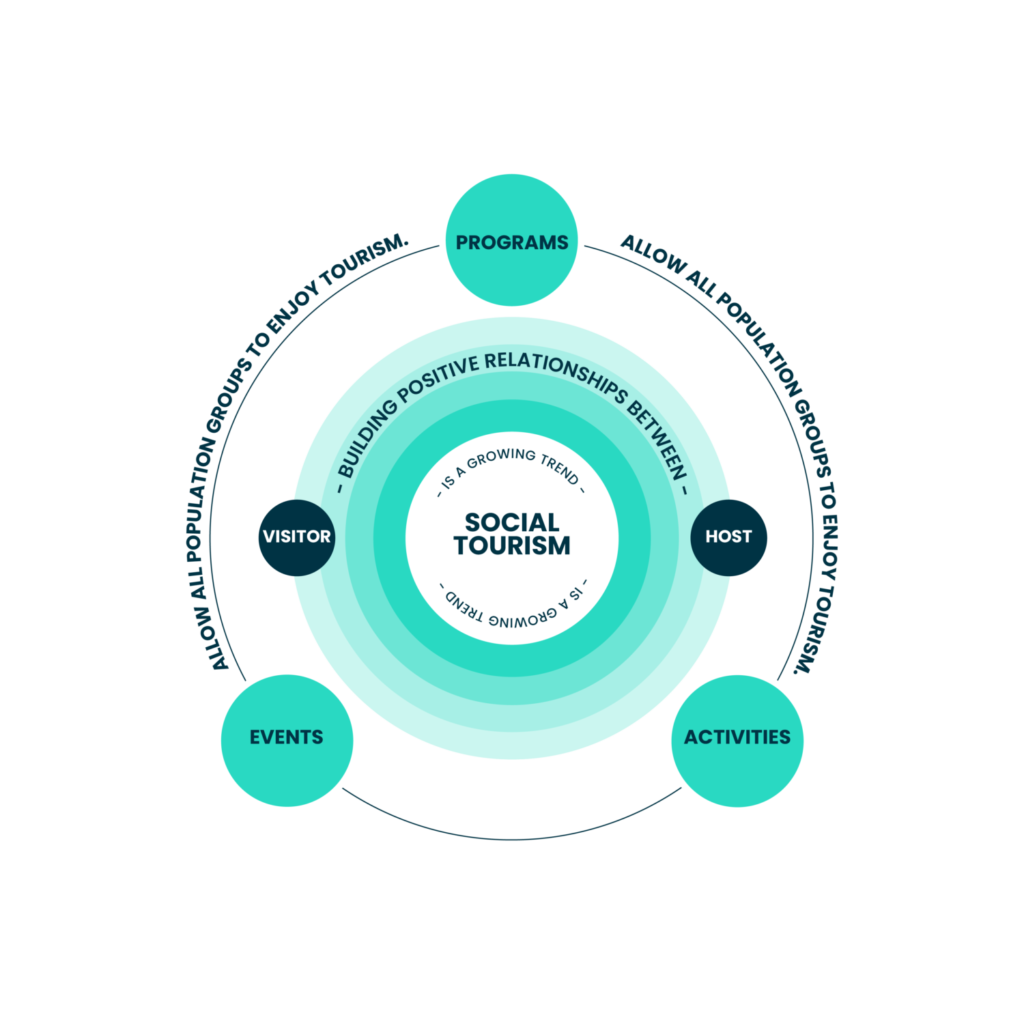
In a nutshell, social tourism focuses on providing economic, social, and cultural benefits to travelers and their host communities.
On the one hand, travelers can participate in social tourism by contributing to their destinations – volunteering, participating in local projects, helping build homes for disadvantaged local groups, supporting local artists and crafters, donating, and more.
On the other hand, some travelers can be the beneficiaries of social tourism . Countless government and private tourism organizations provide travel opportunities to those groups that wouldn’t otherwise be able to enjoy traveling – impoverished families, people with disabilities, children, and seniors, for instance.
Moreover, some popular travel destinations are starting to invest in building a more accessible infrastructure that improves the traveling experience for all. You’ll find wheelchair-accessible beaches in Cyprus , braille-etched railings at Castel Sant’Elmo in Naples, and “ touchable paintings ” at museums worldwide.
Considering that social tourism can take many forms, it’s not surprising that it’s known under many different names – sustainable tourism, accessible tourism, tourism for all, enlightening tourism, and responsible tourism , among others.
Social tourism can be financed in one of several ways, depending on its particular type. If you want to contribute to the destination you’re visiting, you’d most commonly have to finance any activities and events you participate in out of pocket .
You could join a charitable organization that covers expenses for certain activities, such as building homes for the locals, for instance, where it might cover the costs of the materials. However, you’d still likely have to pay for any other travel-related expenses yourself – accommodation, transportation, food, and more.
Social tourism events and activities for children, impoverished families, people with disabilities, and others, on the other hand, are most commonly fully financed by local and federal governments , employers, non-profit organizations, and charities . On occasion, the participants could even receive a small spending allowance that enables them to fully enjoy their travels.
The main objectives of social tourism include:
- Supporting local communities – leaving a positive mark on the communities in your travel destinations;
- Discovering new destinations – visiting places off the beaten path and going to less traveled-to countries;
- Learning about new cultures – getting to know the locals, their languages, cultures, traditions, and history;
- Providing economic benefits to host countries – shopping local, investing in arts and crafts from the local artists, improving the local economy;
- Making travel accessible to all – allowing everyone to experience the wonders of traveling, regardless of their socio-economic group, age, health, or more.
Ultimately, the main goal of social tourism is connecting travelers with their host countries, helping build international relationships, and making travel more enjoyable and more responsible.
There are multiple ways to promote and support social tourism:
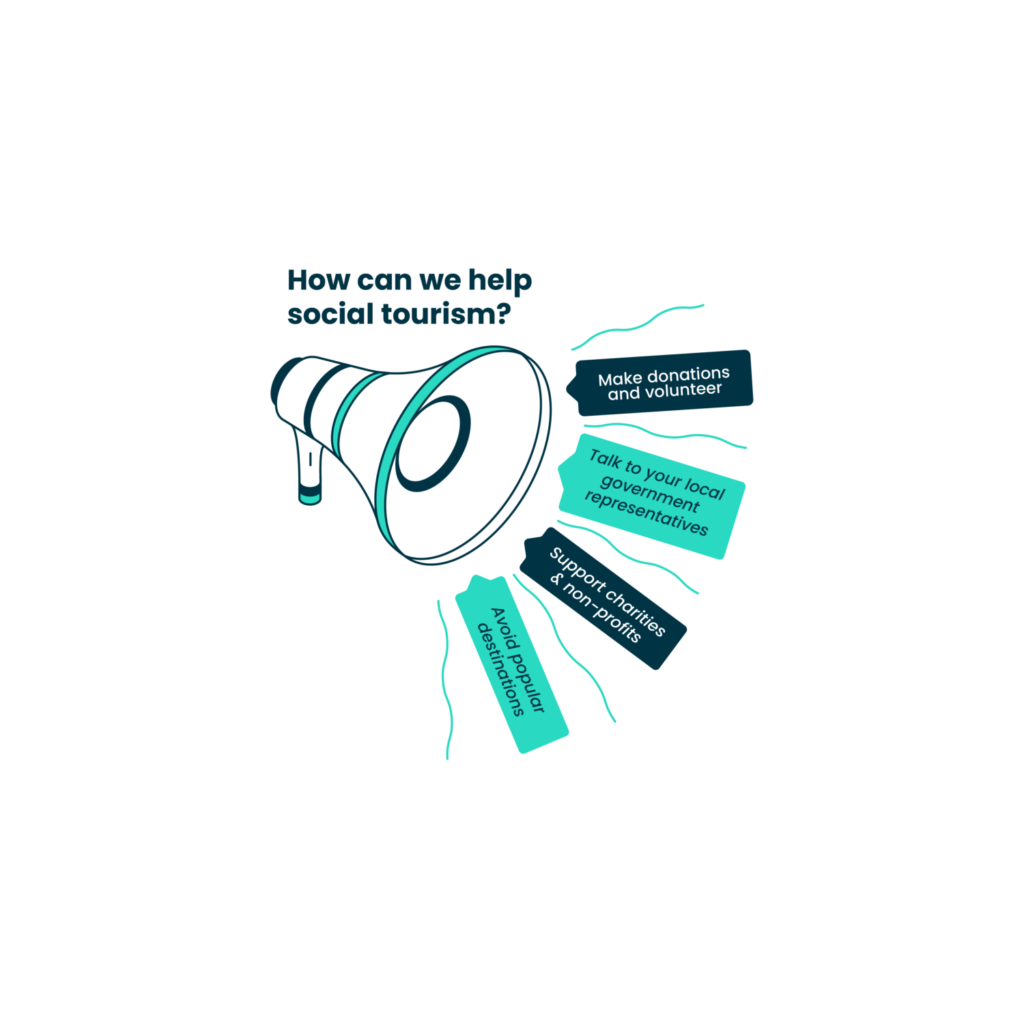
- Support charities and non-profits – many social tourism charities rely on contributions from individuals to create immersive programs and activities that help tourists and host countries;
- Make donations – donate to relevant organizations that support local communities in your favorite travel destinations or those that offer travel opportunities to underprivileged groups in your area;
- Volunteer – join volunteer groups that connect you with locals;
- Avoid popular destinations – go off the beaten path and travel to lesser-known destinations;
- Talk to your local government representatives – as many social travel activities are government-funded, you can talk to the local representatives to find the best ways to support social tourism.
You don’t have to go out of your way to support social tourism. Even minor changes to your typical traveling habits could help – booking accommodation with a host family instead of a hotel, buying souvenirs from local artists, eating at small local restaurants, recycling while traveling, and more.
As evidenced so far, Social Tourist isn’t just a Charlie D’Amelio’s apparel brand. It’s an increasingly important concept that presents immeasurable benefits to travelers and their host communities. Therefore, it’s not surprising that we’re seeing more and more real-life examples of social tourism.
Take a look at just a few organizations that are helping make social tourism mainstream.
Make a Difference (MAD) Travels
Make a Difference (MAD) Travels is a unique social entrepreneurship based in the Philippines. It offers sustainable, one-of-a-kind travel experiences to international tourists who want to make a difference. It focuses on building relationships between travelers and their destinations of choice , leading exciting off-the-beaten-path tours, introducing travelers to the local cultures, and offering educational courses and experiences.
What’s more, MAD Travels enables you to support local communities even from a distance. You can support communities in Zambales or Rizal by gifting a tree planted on your behalf or shopping for local Filipino products like organic honey or bamboo straws directly from the Mad Travels site.
Awaken
Awaken is all about traveling with a purpose. Based in Ecuador, it started as an at-risk youth foundation and has evolved into a social tourism organization that helps you support the communities you visit while enjoying immersive travel experiences.
The organization’s main aim is to support children and their parents who come from juvenile detention centers and immerse them back into society. By joining one of Awaken’s programs, you can travel to some of Ecuador’s most mesmerizing destinations, join volunteer groups, go on active tours, and learn all about the local people, culture, and history.
Invisible Cities
Invisible Cities is a UK-based social enterprise that supports homeless people through travel. Currently available only in some of the biggest cities in the UK, including Glasgow, Manchester, Edinburgh, Cardiff, and York, it helps teach homeless people how to become walking tour guides in their cities.
Invisible Cities offers comprehensive skill-building training and encourages its guides to deliver authentic tours focusing on the monuments and locations they have chosen.
The organization aims to dispel myths and stereotypes regarding homelessness and improve the lives of those impacted by it.
Operation Groundswell
Operation Groundswell offers immersive programs across Central and South America, East Africa, and Asia, redefining backpacking experiences and allowing you to get truly immersed in the cultures you’re exploring.
Started by a group of backpacking enthusiasts, it’s grown to be one of the largest organizations of its kind. You can join open, pre-planned programs or even design your own custom experiences. Choose the regions you want to visit, select the theme you’d like to learn more about (such as human rights, health, environment, or education), and design an active holiday you’ll never forget.
Good Travel
Good Travel promotes travel experiences that lead to a positive social, economic, and environmental impact. To that end, the organization collaborates with local businesses that give back to their communities, partners with international non-profit organizations, and donates to countless global charities.
Each trip is designed to fit the Good Travels ethos, offset our carbon footprint, support marginalized groups, boost the local economy, and deliver memorable travel experiences.
Although there are many pre-planned trips to countries like Peru, New Zealand, Fiji, and others, you can also develop a personalized itinerary that suits your traveling preferences.
Okavango Craft Brewery
Okavango Craft Brewery in Northern Botswana is a unique addition to the list. Not specifically created as a social tourism organization but rather a great local brewery with a cause, it enables you to support Okavango’s people and elephants and enjoy good beer made from locally-sourced ingredients.
As you enjoy your dinner and drinks, you’ll help the brewery support the NGO EcoExist non-profit organization that helps promote a sustainable existence between farmers and elephants in areas with high elephant-human conflict. If you’re traveling in the area, pay the brewery a visit to help support the farmers that allow you to enjoy local beers.
Have Fun Do Good
Have Fun Do Good (HFDG) is an organization developed for adventure-seekers who want to do good on their travels. Whether staying close to home or traveling to far-off destinations, HFDG helps you create immersive travel experiences and join volunteer programs that enable you to make a difference.
You’ll get to meet new people, explore beautiful locations, learn about new cultures, and support international charities.
HFDG offers small group travel experiences and corporate events that can improve your team-building and help your business support good causes.
International Social Tourism Organisation (ISTO)
International Social Tourism Organisation (ISTO) is one of the largest (and oldest) social tourism non-profits, established in 1963. It promotes responsible, accessible tourism for all that benefits individuals and communities across the globe.
The organization has five primary goals to improve:
- Accessibility;
- Fair business;
- Environment;
- Solidarity;
- Quality of life.
ISTO aims to make leisure, holidays, and tourism accessible to all – the youth, seniors, people with disabilities, and others. It partners with local businesses and governments to create opportunities for everyone to enjoy tourism without limitations while simultaneously supporting and benefiting the local populations, their cultural heritage, and their environment.
Elevate Destinations
Elevate Destinations operates under the belief that travel is sacred, and as such, it should always have a positive social and environmental impact. Therefore, it offers memorable travel experiences that help you find greater meaning in the world while connecting with coglobal communities, supporting the environment, and preserving our natural surroundings.
Elevate Destinations offers immersive, family-friendly trips, adventurous travels for adrenaline-seekers, learning journeys, charity challenges, donor travel experiences, and more for individuals and organizations alike.
Moreover, it’s developed a new travel program, “Buy a Trip, Give a Trip”, that allows you to support local youths. The program gives local children an opportunity to visit some of the most popular tourist sites in their own countries.
Responsible Travel
Last but certainly not least is Responsible Travel , an organization that focuses on nature preservation and empowering local communities. It prioritizes responsible travel, reducing carbon emissions, developing accessible travel opportunities, and organizing volunteer events that allow you to give back to the communities you’re visiting.
It also has a “Trip for Trip” program that allows you to send a disadvantaged child on a day trip when you book your own holiday, all at no additional cost.
Social tourism is quickly taking off, becoming one of the biggest tourism trends of the decade. Allowing you to visit some of the most astonishing destinations, support your host communities, preserve nature, and make travel accessible to all, social tourism is making a world of difference one trip at a time.
Subscribe to our newsletter
Yay you are now subscribed to our newsletter.

Marc Truyols has a degree in Tourism from the University of the Balearic Islands. Marc has extensive experience in the leisure, travel and tourism industry. His skills in negotiation, hotel management, customer service, sales and hotel management make him a strong business development professional in the travel industry.
Mize is the leading hotel booking optimization solution in the world. With over 170 partners using our fintech products, Mize creates new extra profit for the hotel booking industry using its fully automated proprietary technology and has generated hundreds of millions of dollars in revenue across its suite of products for its partners. Mize was founded in 2016 with its headquarters in Tel Aviv and offices worldwide.
Related Posts

30 Most Important Travel Industry Events for 2024
30 min. Social share: 2024 is packed with must-attend travel industry events. Stop by to discover all relevant events conveniently grouped by continents with listed dates, themes, and locations! Many travel industry experts believe that travel industry events play a pivotal role in shaping the future of the travel industry. Why is this so? It’s […]

Empowering Equality: Mize Leads the Way in Travel Technology
7 min. Are we all equal? Are we all equally represented in the business world? In some professional sectors, there might still be some under-representation of women, minorities, and the LGBTQIA+ community. The tech sphere is no different, but is the travel tech sector a spark of hope? As the business world becomes more diverse, […]

Slow Tourism Case Studies: Examples to Truly Understand Slow Tourism
14 min. The tourism industry is moving at an ever-accelerating pace. That’s because the tourism industry is perhaps one of the verticals that depend on the most factors. One of the main factors that affect it is social movements, given that tourism brands of all sizes always cater to the needs of consumers. One of […]
- Privacy & Disclaimer
Living There
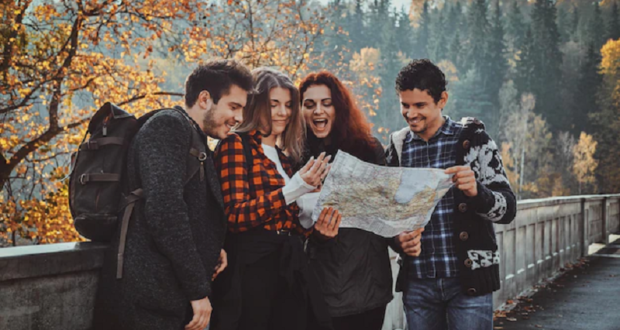
Social Tourism: Cultivating Cultural Exchange and Inclusive Growth
The transformative power of social tourism: promoting cultural exchange and economic growth, introduction social tourism.
Social tourism, a concept often overlooked in traditional travel discussions, holds the key to fostering cultural awareness, empowering communities, and driving inclusive economic growth. In this article, we delve into the essence and explore its potential to transform societies.
By consciously developing initiatives, we can unlock a multitude of benefits for both tourists and hosts.
In the dynamic landscape of global travel, social tourism emerges as a catalyst for change. This article explores the multifaceted dimensions of social tourism, delving into its origins, benefits, challenges, and ethical considerations. As we navigate the transformative power , we uncover its potential to foster cultural awareness, empower communities, and drive inclusive economic growth when conscientiously developed.
Section 1: Understanding Social Tourism and Its Evolution
once a niche concept, has evolved into a powerful force shaping the travel industry. This section provides insights into the origins, tracing its roots from elite luxury travel to democratized leisure and tourism. We explore the pillars and objectives initiatives, emphasizing sustainable development through meaningful host-tourist engagement.
Background on Origins Social Tourism
Social tourism has humble beginnings, tracing its roots to a shift from elite and luxury travel to democratized leisure and exploration.
The concept emerged as a response to the growing need for inclusivity in the travel sector, recognizing that everyone should have the opportunity to experience the enriching benefits of tourism.
Pillars and Objectives
To comprehend the true scope of social tourism, we need to explore its pillars and objectives. These initiatives aim not only to provide recreational opportunities
but also to contribute to sustainable development through meaningful engagement between hosts and tourists. This section will delve into the principles that guide successful projects.
Section 2: Benefits and Positive Impacts
This section dissects the economic, social, and environmental advantages. From income generation and job creation to the preservation of cultural heritage, customs, and arts,cemerges as a powerful agent of positive change. Environmental protections and destination improvements take center stage, showcasing the shared value where both tourists and hosts gain intercultural awareness.
Economic Perks Social Tourism
One of the primary advantages lies in its potential to generate income, create jobs, and stimulate local business growth.
By encouraging travel to less-explored regions, social tourism becomes a catalyst for economic development, breaking the traditional tourism mold that often concentrates wealth in popular destinations.
Social/Cultural Exchange
Beyond economic benefits, social tourism facilitates a rich exchange of cultures. It becomes a vehicle for the preservation of heritage, customs, and arts.
This section will highlight instances where has played a pivotal role in sustaining and celebrating the uniqueness of various communities.
Environmental Protections
As we explore the positive impacts, it is essential to discuss the environmental benefits. Responsible initiatives can contribute to destination improvements, ensuring that the ecological balance is maintained, and the natural beauty of a place is preserved for future generations.
Shared Value
The beauty lies in the reciprocity between tourists and hosts. This section will emphasize how these interactions lead to increased intercultural awareness, fostering understanding and empathy between diverse communities.
Section 3: Challenges and Ethical Considerations
As gains momentum, it brings along a set of challenges and ethical dilemmas. This section addresses the need to prevent exploitation and cultural disruption, managing environmental impacts , and overcoming accessibility constraints across disabilities, age, and income. Striking a balance between authenticity and commercialization becomes paramount in ensuring the sustainability.
Preventing Exploitation
While brings numerous benefits, it is not without its challenges. This section will discuss the importance of preventing exploitation and cultural disruption, emphasizing the need for ethical practices in the development and execution initiatives.
Managing Environmental Impact
With the rising tide of tourism, there is an increasing concern about its environmental impact. This part of the article will explore strategies for managing and mitigating these impacts, ensuring that social tourism remains sustainable in the long run.
Accessibility Constraints
Inclusivity is a cornerstone , but accessibility constraints can hinder its reach. We will discuss the challenges posed by disabilities, age, and income disparities and explore ways to overcome these barriers.
Promoting Authenticity
As social gains popularity, the risk of commercialization looms large. This section will delve into the importance of
promoting authenticity and maintaining the cultural integrity of host communities amid the commercialization of tourism.
Section 4: Implementing and Participating in Social Tourism
Effective implementation requires collaborative efforts from government, the private sector, and local communities. This section explores successful partnerships and highlights the role of volunteer programs in providing ethical options for participants. Responsible travel guidelines are presented for tourists, ensuring a harmonious and respectful experience for all involved. The section concludes with a glimpse into the future, exploring potential innovations in the realm.
Partnerships Social Tourism
Effective requires collaboration between governments, the private sector, and local communities. This section will explore successful models of partnership and highlight the role each stakeholder plays in the development initiatives.
Volunteer Programs Social Tourism
Volunteer programs can be a powerful tool for fostering. This part of the article will provide insights into the opportunities available and guide readers on finding ethical volunteer options that contribute positively to host communities.
Responsible Travel Guidelines
For social tourism to be truly transformative, tourists must play their part. This section will outline responsible travel guidelines, helping tourists make informed choices that align with the principles.
Future Outlook and Innovations
To conclude the practical aspects, we will explore the future outlook of this transformative concept. From technological innovations to evolving travel trends, we will discuss how social tourism can adapt and thrive in the years to come.
In summary, the potential is vast and transformative. By unlocking economic opportunities, fostering cultural exchange, and addressing ethical considerations, the power to reshape the travel landscape.
This article serves as a call to action for stakeholders to embrace and develop responsibly, ensuring that its benefits are realized without compromising the integrity of host communities.
As we navigate the future of travel, let be a guiding force towards a more inclusive, sustainable, and culturally rich world.
FAQs on Social Tourism
1. what exactly is social tourism.
Unpacking: A Simple Guide
Discover the essence of social tourism in straightforward terms. This FAQ breaks down the concept, explaining how it goes beyond ordinary travel to foster cultural awareness, empower communities, and drive inclusive economic growth.
2. How Did Social Tourism Evolve Over Time?
Evolution: From Elite to Inclusive
Explore the journey from its origins, shifting away from exclusive luxury travel to becoming an inclusive leisure and tourism option. This FAQ sheds light on the transformative path that has made a powerful force in the travel industry.
3. What Are the Pillars and Objectives of Social Tourism Initiatives?
Core Principles: Understanding the Pillars
Delve into the foundations initiatives. This section elucidates the core pillars and objectives that guide the development, emphasizing sustainable practices and meaningful engagement between hosts and tourists.
4. What Positive Impacts Does Social Tourism Bring?
Unlocking Benefits: Economic, Social, and Environmental Perks
Explore the tangible benefits of social tourism. From generating income and jobs to preserving cultural heritage, this FAQ outlines the economic, social, and environmental advantages that arise when communities engage in meaningful initiatives.
5. What Challenges Does Social Tourism Face?
Navigating Challenges: Ethical Considerations Explored
Uncover the potential challenges and ethical considerations associated with. This section addresses issues such as preventing exploitation, managing environmental impacts, and maintaining authenticity amid commercialization.
6. How Can Social Tourism Be Implemented Responsibly?
Building a Responsible Foundation: Partnerships and Programs
Learn about the practical aspects of implementing responsibly. This FAQ highlights the importance of partnerships between government, the private sector, and communities. It also explores volunteer programs and responsible travel guidelines for tourists.
7. What Does the Future Hold for Social Tourism?
Future Outlook: Innovations Shaping
Look into the crystal ball of social tourism. This section provides insights into potential innovations and trends that could shape the future, ensuring that it remains a dynamic and evolving force in the travel industry.
8. How Can Individuals Contribute to Social Tourism?
Everyday Impact: Personal Involvement and Responsible Travel
Explore how individuals can contribute. From choosing ethical travel options to being responsible tourists, this FAQ offers practical advice for those looking to make a positive impact through their travel choices.

About M Williams
Related Posts

Yttowav: Exploring Nature’s Serenity and Beauty
March 9, 2024

Belize City Tourism: Exploring Caribbean Charm and Culture

Axiom Telecom LLC: Trusted Telecommunication Solutions Provider
March 8, 2024
Social tourism
- Reference work entry
- First Online: 01 January 2016
- Cite this reference work entry

- Lynn Minnaert 3
116 Accesses
Download reference work entry PDF
Social tourism refers to initiatives aimed to include groups that would otherwise be excluded from tourism. Its earliest definition refers to “the relationships and phenomena in the field of tourism resulting from participation in travel by economically weak or otherwise disadvantaged elements in society” (Hunzicker 1951 :1). Other scholars have defined it as tourism with an added moral value, of which the primary objective is to benefit the host or the tourist populations (Minnaert et al. 2011 ). In practice, social tourism usually refers to budget-friendly domestic holidays. In some cases, day trips to themeparks, museums, and attractions are funded or made available at highly reduced rates by charities or agencies in the public sector.
Structure and operation
Social tourism initiatives can be provided by the public or the voluntary sector . In Anglo-Saxon countries, charities usually play a key role, whereas in mainland Europe and several countries in Latin America, the public sector is a key stakeholder. In those countries, social tourism is provided at either very limited cost to the state or in ways which simultaneously stimulate the local economy and increase the income of the state via taxation and a reduction of unemployment benefits. Where the public sector plays a role, the concept has been implemented in different ways to suit national contexts: several countries such as France and Hungary operate holiday voucher schemes, and other countries or regions such as Spain , Portugal , and Flanders, Belgium , have established public-private partnerships (McCabe et al. 2011 ).
Both the implementations and the justifications and goals of social tourism can differ greatly. The development of the working classes, better health for inner-city children, wider access to the benefits of tourism, loyalty to unions or companies, and economic development of regions have all been, and in some cases still are, seen as valid reasons for such provisions (Minnaert et al. 2011 ).
A final difference concerns the types of products that are offered. Some schemes offer one product only, whereas others have a range to choose from. The IMSERSO program in Spain, for example, has only one product: group holidays exclusively for senior citizens, including coach transport, accommodation , meals, and activities (Imserso 2009 ). In contrast, the Family Holiday Association ( 2013 ), a UK-based charity, offers more choices: it funds week-long holidays for individual families (usually in domestic caravan parks) and group holidays which may be shorter. The Tourism Participation Centre in Flanders (Belgium) also offers individual and group holidays, but has an additional range of affordable day trips.
Social tourism impacts
Beneficiaries of social tourism are people who would like to travel but cannot due to a certain disadvantage, lack of money, health problems, or disability, that inhibits participation in tourism. In several countries of the European Union, social tourism is provided at either very limited cost to the state or in ways which simultaneously stimulate the local economy and increase the income of the state via taxation and reduce unemployment (Minnaert et al. 2011 ). Social tourism is often used as a socioeconomic regeneration measure. Scholars have conducted research on the social impacts of this practice (McCabe 2009 ; Minnaert et al. 2010 ). Their studies suggest that benefits from social tourism range from increases in self-esteem, improvement in family relations, and widening of travel horizons to more proactive attitudes to life and participation in education and employment .
The potential economic benefits have also received increasing levels of attention. A much cited example is the IMSERSO program in Spain, which offers domestic holidays for senior citizens in coastal areas during the shoulder season. The holidays are financed through contributions by beneficiaries (70 %) and the public sector (30 %). The public sector investment yields cost savings and earnings, including longer seasons and increased employment in the coastal regions, with the expenditure prompting higher tax income.
Around 300 hotels participate in the scheme, benefiting around one million participants in the 2008–2009 season and generating and/or maintaining an estimated 80,000 jobs. The Spanish government has allocated US$118 million (€105 million) for the 2009–2010 season. It is believed that for every Euro invested yields $4.5 (or €4) in tax, spend and reduction in benefit payments (Imserso 2009 ). To stimulate similar initiatives throughout the region, the European Commission for Enterprise and Industry launched the Calypso program in 2008 in order to produce such exchanges and opportunities among European countries (Minnaert et al. 2011 ).
The social tourism literature makes limited distinctions among related products and their respective suitability and attractiveness to different types of beneficiaries. Further exploratory research is required to uncover the usefulness of offering a range of different holiday options and how the choice of product can be best tailored to certain characteristics of the beneficiaries.
Policy and policymaking , quality of life , social capital , social class .
Family Holiday Association 2013 The Family Holiday Association www.familyholidayassociation.org.uk (5 March 2015).
Hunzicker, W. 1951 Social Tourism: Its Nature and Problems. Berne: International Tourists Alliance Scientific Commission.
Google Scholar
Imserso 2009 Instituto de Mayores y Servicios Sociales www.imserso.es (5 March 2015).
McCabe, S. 2009 Who Needs a Holiday? Evaluating Social Tourism. Annals of Tourism Research 36:667-688.
Article Google Scholar
McCabe, S., L. Minnaert, and A. Diekmann 2011 Social Tourism in Europe: Theory and Practice. Bristol: Channel View.
Minnaert, L., R. Maitland, and G. Miller 2011 What is Social Tourism? Current Issues in Tourism 5:403-415.
Minnaert, L., B. Quinn, K. Griffin, and J. Stacey 2010 Social Tourism for Low-income Groups. In Tourism and Inequality, S. Cole and N. Morgan, eds., pp.38-57. Wallingford: CABI.
Download references
Author information
Authors and affiliations.
Preston Robert Tisch Center for Hospitality and Tourism, New York University, 7 East 12th Street, 425H, 10003, New York, USA
Lynn Minnaert
You can also search for this author in PubMed Google Scholar
Corresponding author
Correspondence to Lynn Minnaert .
Editor information
Editors and affiliations.
University of Wisconsin-Stout, Menomonie, USA
Jafar Jafari
The Hong Kong Polytechnic University, Hong Kong, China
Honggen Xiao
Rights and permissions
Reprints and permissions
Copyright information
© 2016 Springer International Publishing Switzerland
About this entry
Cite this entry.
Minnaert, L. (2016). Social tourism. In: Jafari, J., Xiao, H. (eds) Encyclopedia of Tourism. Springer, Cham. https://doi.org/10.1007/978-3-319-01384-8_182
Download citation
DOI : https://doi.org/10.1007/978-3-319-01384-8_182
Published : 25 June 2016
Publisher Name : Springer, Cham
Print ISBN : 978-3-319-01383-1
Online ISBN : 978-3-319-01384-8
eBook Packages : Business and Management Reference Module Humanities and Social Sciences Reference Module Business, Economics and Social Sciences
Share this entry
Anyone you share the following link with will be able to read this content:
Sorry, a shareable link is not currently available for this article.
Provided by the Springer Nature SharedIt content-sharing initiative
- Publish with us
Policies and ethics
- Find a journal
- Track your research
Academia.edu no longer supports Internet Explorer.
To browse Academia.edu and the wider internet faster and more securely, please take a few seconds to upgrade your browser .
Enter the email address you signed up with and we'll email you a reset link.
- We're Hiring!
- Help Center

What is social tourism?

This article examines the definitions and implementations of the concept of ‘social tourism’ that are in use in Europe today. Examples show that the concept has been implemented in many different ways to suit national contexts and that the justifications and goals of social tourism can differ greatly. The question arises how one can define the boundaries of this versatile and complex concept. This article proposes a model to clarify the interrelationships between the different interpretations: it highlights where common ground exists, but also where contradictions are apparent. The model consists of four main categories: the participation model, the inclusion model, the adaptation model and the stimulation model. The model draws on the historical development of social tourism and the ethical foundations for provision, and it is supported by a range of examples of European practice. Through this sub-categorisation of the concept, it is argued that a ‘scientification’ of the concept of social tourism can take place, so that the term does not lose its academic and political value. This article concludes by proposing a definition for social tourism that can effectively set the concept apart from other forms of tourism with attached social benefits.
Related Papers
Tourism Culture &# 38; …
Lynn Minnaert
Abstract: Although social tourism has been seen in a number of countries as having potential to counter social exclusion, formulating a definition for the term is difficult. "Social tourism" is used to describe a variety of initiatives for a variety of different social groups. These range from holidays for children from low-income backgrounds, through improving accessibility in hotels, to offering ecological holidays. This article discusses the definitions of "social tourism," distinguishing host-related and visitor-related forms, and aims to clarify its potential value in combating social exclusion. It does so by examining the ethical values underlying the way social tourism is defined and suggesting a theoretical framework for the effects of social tourism. Some ethical views of society place an a priori moral duty on the stronger strata to support the weaker. Others do not judge the support of the weaker strata as an a priori dominant ethical principle, and judge the welfare of the state by the opportunity of all its strata. Ethical positions that see stronger strata as having a moral duty to support the weaker are more likely to be supportive toward both host-related and visitor-related social tourism. Those that do not will probably support host-related social tourism, but will support visitor-related social tourism, if publicly funded, only if it can demonstrate benefits for the whole of society. In Western liberal democracies where this is a prevailing view, visitor-related social tourism might justify public expenditure as a potential tool to combat social exclusion. It can be seen as a merit good if it improves excluded peoples' handicapping characteristics, through, for example, beneficial effects in health, self-esteem, and improvement of family relationships. However, there is little research to test its effectiveness in achieving these outcomes. Further research is required to evaluate whether social tourism can have a significant role in combating social exclusion, and thus justify support from public expenditure.
Journal of Policy Research in Tourism, Leisure and Events
Carlos Cardoso Ferreira
Annals of Tourism Research
Social Tourism for low-income groups forms part of social policy in several countries of mainland Europe, but little research evidence of its benefits exists. This study empirically examines these benefits in terms of increases in social and family capital. Interviews and focus groups were conducted with participating families and their support workers, in a semi-longitudinal research design. Social Tourism was found to increase family capital in the short term, and social capital—in terms of social networks, related pro-active behavior and self-esteem—in the medium term. These increases can be seen as beneficial for the participants and to wider society. Consequently it is suggested that Social Tourism may be a cost-effective addition to social policy.
Judy Corlyon
Remigijus Kinderis
Based on the scientific literature, statistic data and legal documents, adaptation of social tourism as a branch of alternative tourism in Europe and at the same time in Lithuania is researched in theoretical and practical aspects. The concept of social tourism, definition criteria and evaluation aspects are revealed; management of social tourism is analyzed: participants, conditions and principles. Special attention is paid to the evaluation of contribution of social tourism to generating national income and regional development, to analysis of the situation of social tourism in Europe and Lithuania as well as to future tendencies of development Objective of this article-to review differentiation of conception of social tourism, problems and challenges of exclusiveness.
A perspective about Social Tourism
Damla Kurtuluş
Whereas social tourism does not have a precise definition on the record, onwards its implementation, what exactly signifies or what it encompasses, and whether it requires defining has been a controversial issue. Aside from many opinions and modeling illustrations, this is the explication that I understand or want to understand best: it is the concept that incorporates activities that provide a social benefit to each relevant component of the society in the field of tourism. Social and economic sustainability is what every element of society deserves, and social tourism solutions present this and have still being continued today have emerged from this need. I believe the benefits of social tourism, both economically and socially, are immense. However, understanding whether the commercial advantages or ethical importance of social tourism is a more prominent factor is a disputed issue. Besides, only the beneficiaries, such as the elderly, the disabled, and people whose income or health is not sufficient for any tourism activity, are considered as they get advantageous from social tourism activities. But also, the institutions and organizations that provide this service, the government, sector employees, and the others in the community can potentially benefit from development of social tourism. While considering social tourism as a need, I will speak about the positive impact of social tourism on all these parties.
Social Tourism in Europe: …
Robert Maitland
Cinthia Rolim de Albuquerque Meneguel
Social Tourism is a public policy, involving the government, industry professionals and the society, which deserve special attention due to their particularities. This is a post Industrial Revolution tourist segmentation, where the workers benefit from features such as paid vacation and the right to rest weekly, thing which enables the enjoyment of leisure. The Ministry of Tourism in Brazil defines Social Tourism as "a mode which seeks a way to lead and engage in tourism activities promoting equality of opportunity, fairness, the solidarity and the exercise of citizenship in the context of inclusion". The democratization of access to tourism is an important topic discussed in Brazil, which will soon host two of the most major sporting events on the planet - the World Cup (2014) and the Olympic Games (2016), in addition to this, tourism activity is in full ascension. Within the academic universe it is also important to hold discussions pertinent to the subject, because this subject is not given enough importance at graduation and teacher training, but is present in everyday life in schools and professional environments. In this way tourism training and social innovation was developed with the objective of involving 40 teachers from the hospitality and leisure hub of the Paula Souza Center, for a new market reality that aims to innovation in Social Tourism. Therefore, in this way the teacher becomes a local transformer agent within their educational unit. The methodology used was formative, where during the six thematic meetings throughout the year of 2013, each participant could experience practical experiences on tourism and social innovation. The meetings took place in spaces that develop social tourism, and because the training was published, an e-book featuring articles relating to practical work was developed by teachers in their educational units.
RELATED PAPERS
빅카지노〃〃GCN777。COM〃〃경륜카페
zulhelman zulhelman
Journal of Structural Chemistry
Per-Åke Nygren
Osteoarthritis and Cartilage
J. Buckwalter
Michael Pondělíček
Michael Lewyn
Kiedy myślimy rodzina...
Sławomir Bukalski
Springer Climate
Otto Navunicagi
European Journal of Cancer Supplements
Monika Ducceschi
American Journal of Tropical Medicine and Hygiene
ALBERTO TOBON CASTAÑO
Muhammad Hafizd Anshari
Open Journal of Geology
M. Hafedh Hamza
Journal of the Japanese Society of Revegetation Technology
Takeaki Oiso
Fusion Technology
Peter Groner
Khaled SALEH
Journal of Clinical Microbiology
sasi dharan
Nuria Castro
İslam araştırmaları dergisi
Ceyda Gürman
Plant Cell Reports
Bernstein Nirit
hrcak.srce.hr
Sort-statistics and Operations Research Transactions
sara Hatami
Development in Practice
Chandra T Mohanty
Tectonophysics
Jun-Ichi Kimura
BMC Public Health
John Ssempebwa
RELATED TOPICS
- We're Hiring!
- Help Center
- Find new research papers in:
- Health Sciences
- Earth Sciences
- Cognitive Science
- Mathematics
- Computer Science
- Academia ©2024
What is social tourism?
Minnaert, L., Maitland, R. and Miller, G. 2011. What is social tourism? Current Issues in Tourism. 14 (5), pp. 403-415. https://doi.org/10.1080/13683500.2011.568051
Related outputs
Tourism Management: an introduction. 3rd edition Inkson, C. and Minnaert, L. 2022. Tourism Management: an introduction. 3rd edition. London Sage.
Beyond image: Imagined experiences of a destination Cherifi, B., Smith, A., Maitland, R. and Stevenson, N. 2018. Beyond image: Imagined experiences of a destination. International Journal of Tourism Research . 20 (6), pp. 748-755. https://doi.org/10.1002/jtr.2227
The PTA: Promoting Swiss Tours, 1888-1939 Dominici, S. and Maitland, R. 2016. The PTA: Promoting Swiss Tours, 1888-1939. Annals of Tourism Research. 60, pp. 31-47. https://doi.org/10.1016/j.annals.2016.05.010
Destination images of non-visitors Cherifi, B., Smith, A., Maitland, R. and Stevenson, N. 2014. Destination images of non-visitors. Annals of Tourism Research . 49, pp. 190-192. https://doi.org/10.1016/j.annals.2014.09.008
Prosuming creative urban areas. Evidence from East London Pappalepore, I., Maitland, R. and Smith, A. 2014. Prosuming creative urban areas. Evidence from East London. Annals of Tourism Research. 44, pp. 227-240. https://doi.org/10.1016/j.annals.2013.11.001
Backstage behaviour in the global city: tourists and the search for the ‘real London’ Maitland, R. 2013. Backstage behaviour in the global city: tourists and the search for the ‘real London’. Procedia: Social and Behavioral Sciences. 105, pp. 12-19. https://doi.org/10.1016/j.sbspro.2013.11.002
Global change and tourism in national capitals Maitland, R. 2012. Global change and tourism in national capitals. Current Issues in Tourism. 15 (1-2), pp. 1-2. https://doi.org/10.1080/13683500.2011.634890
Capitalness is contingent: tourism and national capitals in a globalised world Maitland, R. 2012. Capitalness is contingent: tourism and national capitals in a globalised world. Current Issues in Tourism. 15 (1-2), pp. 3-17. https://doi.org/10.1080/13683500.2011.634891
Exploring urban creativity: visitor experiences of Spitalfields, London Pappalepore, I., Maitland, R. and Smith, A. 2010. Exploring urban creativity: visitor experiences of Spitalfields, London. Tourism Culture & Communication. 10 (3), pp. 217-230. https://doi.org/10.3727/109830410X12910355180946
Everyday life as a creative experience in cities Maitland, R. 2010. Everyday life as a creative experience in cities. International Journal of Culture, Tourism and Hospitality Research. 4 (3), pp. 176-185. https://doi.org/10.1108/17506181011067574
Tourism and social policy: the value of social tourism Minnaert, L., Maitland, R. and Miller, G. 2009. Tourism and social policy: the value of social tourism. Annals of Tourism Research. 36 (2), pp. 314-332. https://doi.org/10.1016/j.annals.2009.01.002
Complexity theory and tourism policy research Stevenson, N., Airey, D. and Miller, G. 2009. Complexity theory and tourism policy research. International Journal of Tourism Policy. 2 (3), pp. 206-220. https://doi.org/10.1504/IJTP.2009.024553
City users and the making of distinctive tourism areas in London Newman, P. and Maitland, R. 2009. City users and the making of distinctive tourism areas in London. in: Diamantini, D., Martinotti, G. and Amendola, G. (ed.) Urban civilization: from yesterday to the next day Naples ScriptaWeb.
Tourism as a form of social intervention: the Holiday Participation Centre in Flanders Minnaert, L. and Schapmans, M. 2009. Tourism as a form of social intervention: the Holiday Participation Centre in Flanders. Journal of Social Intervention: Theory and Practice. 18 (3), pp. 42-61.
Tourism and the aesthetics of the built environment Maitland, R. and Smith, A. 2009. Tourism and the aesthetics of the built environment. in: Tribe, J. (ed.) Philosophical issues in tourism Bristol Channel View Publications.
London: tourism moving East? Maitland, R. and Newman, P. 2009. London: tourism moving East? in: Maitland, R. and Newman, P. (ed.) World tourism cities: developing tourism off the beaten track London Routledge.
Developing world tourism cities Maitland, R. and Newman, P. 2009. Developing world tourism cities. in: Maitland, R. and Newman, P. (ed.) World tourism cities: developing tourism off the beaten track London Routledge.
Conclusions for world tourism cities Maitland, R. and Newman, P. 2009. Conclusions for world tourism cities. in: Maitland, R. and Newman, P. (ed.) World tourism cities: developing tourism off the beaten track London Routledge.
"You want to see the people that live here": using everyday life to create a distinctive city destination Maitland, R. 2009. "You want to see the people that live here": using everyday life to create a distinctive city destination. EIAT Conference. Belgrade, Serbia 25 - 27 Sep 2009
Tourists, the Creative Class and distinctive places: the roles of visitors and residents in developing sustainable city tourism Maitland, R. 2009. Tourists, the Creative Class and distinctive places: the roles of visitors and residents in developing sustainable city tourism. TAIEX Conference: Sustainable City Tourism. Zagreb, Croatia 06 Nov 2009
Tourism in national capitals: developing perspectives Maitland, R. 2009. Tourism in national capitals: developing perspectives. ATLAS Annual Conference. Aalborg, Denmark 27 - 29 May 2009 Taylor & Francis.
Tourism and changing representation in Europe’s historic capitals Maitland, R. 2009. Tourism and changing representation in Europe’s historic capitals. Preserving Places: tourism and conservation for a sustainable enhancement of historic centres. Italian National Research Council, Rome 13 - 14 Nov 2009
London: tourism moving East? Maitland, R. 2009. London: tourism moving East? City Futures in a Globalising World: an international conference on globalism and urban change. Madrid, Spain 04 - 06 Jun 2009
Everyday life as a creative experience in cities Maitland, R. 2009. Everyday life as a creative experience in cities. Cities as Creative Spaces for Cultural Tourism Conference. Bogaziçi University, Istanbul, Turkey 19 - 21 Nov 2009
Corporate hospitality in the economic downturn Minnaert, L. 2008. Corporate hospitality in the economic downturn. Tourism Insights.
Social tourism in Flanders Minnaert, L. 2008. Social tourism in Flanders. Tourism Insights.
Corporate hospitality in times of an economic downturn Minnaert, L. 2008. Corporate hospitality in times of an economic downturn. ATLAS Business Tourism Meeting. Warsaw 23 - 26 Nov 2008
Visitor-host relationships: conviviality between visitors and host communities Maitland, R. and Newman, P. 2008. Visitor-host relationships: conviviality between visitors and host communities. in: Hayllar, B., Griffin, T. and Edwards, D. (ed.) City spaces - tourist places: urban tourism precincts Oxford Butterworth Heinemann. pp. 223-243
We’re all tourists now: but what does that mean for cities? Maitland, R. 2008. We’re all tourists now: but what does that mean for cities? in: Akbar, O. (ed.) Archilab 2008: European strategic architecture: exhibition catalogue Bauhaus Dessau. pp. 160-161
"Tourist spots are always very generic": the importance of everyday life for distinctive urban destinations Maitland, R. 2008. "Tourist spots are always very generic": the importance of everyday life for distinctive urban destinations. Travel and Tourism Research Association Conference. Helsinki, Finland 22 - 25 April 2008
Conviviality and everyday life: the appeal of new areas of London for visitors Maitland, R. 2008. Conviviality and everyday life: the appeal of new areas of London for visitors. International Journal of Tourism Research. 10 (1), pp. 15-25. https://doi.org/10.1002/jtr.621
Tourism policy making: the policymakers' perspectives Stevenson, N., Airey, D. and Miller, G. 2008. Tourism policy making: the policymakers' perspectives. Annals of Tourism Research. 35 (3), pp. 732-750. https://doi.org/10.1016/j.annals.2008.05.002
Social tourism: a potential measure against social exclusion? A UK-Ireland perspective Minnaert, L. and Stacy, L. 2007. Social tourism: a potential measure against social exclusion? A UK-Ireland perspective. 3rd Annual Conference on Tourism and Hospitality Research in Ireland: 'Working Together'. Dundalk 12 - 13 Jun 2007
The need to incorporate cultural competence teaching in MICE education: a proposed teaching plan for exploring cultural attitudes towards women-only hotel floors Minnaert, L. 2007. The need to incorporate cultural competence teaching in MICE education: a proposed teaching plan for exploring cultural attitudes towards women-only hotel floors. Second Collaborative Forum for MICE Industry in Guangzhou, Hong Kong and Macao. Macao 27 - 28 Nov 2007
Social tourism: a potential policy to reduce social exclusion? Minnaert, L. 2007. Social tourism: a potential policy to reduce social exclusion? 39th Annual UTSG Conference. Harrogate 03 - 05 Jan 2007
Social tourism for low-income families as a potential policy to reduce social exclusion Minnaert, L. 2007. Social tourism for low-income families as a potential policy to reduce social exclusion. RGS-IBG Annual International Conference 2007: 'Sustainability and Quality of Life'. London 29 - 31 Aug 2007
Social Tourism: a potential policy to reduce social exclusion? The effects of visitor-related social tourism for low-income groups on personal and family development Minnaert, L. 2007. Social Tourism: a potential policy to reduce social exclusion? The effects of visitor-related social tourism for low-income groups on personal and family development. PhD thesis University of Westminster School of Architecture and the Built Environment https://doi.org/10.34737/91z40
EDITORIAL: Special Issue, Journal of Travel and Tourism Marketing: Marketing National Capital Cities Maitland, R. and Ritchie, B.W. 2007. EDITORIAL: Special Issue, Journal of Travel and Tourism Marketing: Marketing National Capital Cities. Journal of Travel & Tourism Marketing. 22 (3/4), pp. 1-5. https://doi.org/10.1300/J073v22n03_01
Tourism, the creative class and distinctive areas in cities Maitland, R. 2007. Tourism, the creative class and distinctive areas in cities. in: Richards, G. and Wilson, J. (ed.) Tourism, creativity and development London, UK Routledge. pp. 73-87
Culture, city users and the creation of new tourism areas in cities Maitland, R. 2007. Culture, city users and the creation of new tourism areas in cities. in: Smith, M.K. (ed.) Tourism, culture and regeneration Wallingford CABI. pp. 25-35
Cultural tourism and the development of new tourism areas in London Maitland, R. 2007. Cultural tourism and the development of new tourism areas in London. in: Richards, G. (ed.) Cultural tourism: global and local perspectives New York Haworth Hospitality Press. pp. 113-129
Guest editorial: Theory and practice, strategy and sustainability Adcroft, A., Dhaliwal, S., Miller, G. and Walsh, P. 2007. Guest editorial: Theory and practice, strategy and sustainability. Management Decision. 45 (1), pp. 5-9.
How can we manage the tourist-historic city? Tourism strategy in Cambridge, UK, 1978-2003 Maitland, R. 2006. How can we manage the tourist-historic city? Tourism strategy in Cambridge, UK, 1978-2003. Tourism Management. 27 (6), pp. 1262-1273. https://doi.org/10.1016/j.tourman.2005.06.006
Social tourism and its ethical foundations Minnaert, L., Maitland, R. and Miller, G. 2006. Social tourism and its ethical foundations. Tourism, Culture and Communication. 7 (12), pp. 7-17.
Cultural tourism and tourism development in London Maitland, R. 2006. Cultural tourism and tourism development in London. in: Richards, G. (ed.) Cultural tourism: global and local perspectives New York, USA Haworth Press.
Developing metropolitan tourism on the fringe of central London Maitland, R. and Newman, P. 2004. Developing metropolitan tourism on the fringe of central London. International Journal of Tourism Research. 6 (5), pp. 339-348. https://doi.org/10.1002/jtr.496
Distinctive places and the reconfiguration of London tourism Maitland, R. and Newman, P. 2004. Distinctive places and the reconfiguration of London tourism. 34th Annual Meeting of the Urban Affairs Association. Washington DC, USA 31 Mar - 02 April 2004
Lessons from the long term: tourism strategy in Cambridge UK, 1978-2003 Maitland, R. 2004. Lessons from the long term: tourism strategy in Cambridge UK, 1978-2003. Tourism: State of the Art II Conference. Glasgow, UK 27-30 Jun 2004
Are VisitBritain's marketing activities effective? Analysis of stakeholder views Maitland, R. 2004. Are VisitBritain's marketing activities effective? Analysis of stakeholder views. London, UK National Audit Office.
The impact of public interventions in the UK tourism sector Maitland, R. 2003. The impact of public interventions in the UK tourism sector. London, UK National Audit Office.
Partnership and collaboration in destination management Maitland, R. 2002. Partnership and collaboration in destination management. in: Wober, K. (ed.) City Tourism 2002: Proceedings of European Cities Tourism's International Conference in Vienna, Austria, 2002 Berlin, Germany Springer. pp. 181-193
Creating successful partnerships in urban destination management Maitland, R. 2002. Creating successful partnerships in urban destination management. Tourism. 50 (3), pp. 293-303.
Planning for leisure and tourism Maitland, R. 2001. Planning for leisure and tourism. UK Office of the Deputy Prime Minister.
Planning for leisure and tourism Evans, C., Maitland, R., Edmundson, T. and Morley, S. 2001. Planning for leisure and tourism. UK Department of Environment, Transport and the Regions.
Tourism destinations Davidson, R. and Maitland, R. 1997. Tourism destinations. London Hodder & Stoughton.
Permalink - https://westminsterresearch.westminster.ac.uk/item/8zz55/what-is-social-tourism
Usage statistics
- Architecture and Design
- Asian and Pacific Studies
- Business and Economics
- Classical and Ancient Near Eastern Studies
- Computer Sciences
- Cultural Studies
- Engineering
- General Interest
- Geosciences
- Industrial Chemistry
- Islamic and Middle Eastern Studies
- Jewish Studies
- Library and Information Science, Book Studies
- Life Sciences
- Linguistics and Semiotics
- Literary Studies
- Materials Sciences
- Mathematics
- Social Sciences
- Sports and Recreation
- Theology and Religion
- Publish your article
- The role of authors
- Promoting your article
- Abstracting & indexing
- Publishing Ethics
- Why publish with De Gruyter
- How to publish with De Gruyter
- Our book series
- Our subject areas
- Your digital product at De Gruyter
- Contribute to our reference works
- Product information
- Tools & resources
- Product Information
- Promotional Materials
- Orders and Inquiries
- FAQ for Library Suppliers and Book Sellers
- Repository Policy
- Free access policy
- Open Access agreements
- Database portals
- For Authors
- Customer service
- People + Culture
- Journal Management
- How to join us
- Working at De Gruyter
- Mission & Vision
- De Gruyter Foundation
- De Gruyter Ebound
- Our Responsibility
- Partner publishers

Your purchase has been completed. Your documents are now available to view.
2. Defining Social Tourism and its Historical Context
From the book social tourism in europe.
- Lynn Minnaert , Anya Diekmann and Scott McCabe
- X / Twitter
Supplementary Materials
Please login or register with De Gruyter to order this product.

Chapters in this book (28)
SOCIAL TOURISM
According to the International Social Tourism Organisation (ISTO) social tourism can be defined as "the connections and phenomena related to the participation of people in the countries of destinations as well as of holidaymakers, of disadvantaged layers of society or those unable to participate in tourism, holidays and their advantages for whatever reason".
A more operational definition, as suggested by professor Louis Jolin from the University of Québec in Montreal, indicates that social tourism "refers to programmes, events, and activities that enable all population groups – and particularly youth, families, retirees, individuals with modest incomes, and individuals with restricted physical capacity – to enjoy tourism, while also attending to the quality of relations between visitors and host communities".
Concerning the main benefits of social tourism The ISTO presents the benefits of social tourism within four main axes:
- Social tourism is "a shaper of society" as "holidays and travel can provide particularly apt occasions for personal enrichment, through the discovery of new places, cultures and civilizations, through physical, artistic, sport and leisure activities, by meeting people across educational or generation divides, and by other responsibilities taken on freely by tourists".
- Social tourism is a promoter of economic growth : "tourism for all is a key to economic strength which generates a continuous flow of people and investment, which contributes to regional development".
- Social tourism participates to the regional and local development by "reconciling tourism development, environmental protection and a respect for the identity of local communities".
- Social tourism is a partner in global development programs: "tourism, when it is controlled and when it respects the natural and cultural environment and local communities, constitutes one of the economic, social and cultural hopes of many developing countries".
Furthermore studies show that social tourism has a tremendous impact on families (Minneart, Metland, Miller, 2009)
Social tourism was found to increase family capital in the short term, and social capital – in terms of social networks, related pro-active behavior and self-esteem - in the medium term. These increases can be seen as beneficial for the participants and to wider society. Consequently it is suggested that social tourism may be a cost-effective addition to social policy.
The family capital is the relationships between the family members and their resilience when faced with adversity. Both adults and children benefited from an increase in family capital, which could encourage the adults to change parenting techniques and encourage a more active lifestyle for the family (for example, going out more). For the children this could lead to better behaviour both at home and at school.
The raise of the social capital of is the increase of the valuable relations between the individual and the world surrounding him or her. Ways in which an increase in social capital can manifest itself include improvements in self-confidence, extension of support networks, new ways of prioritizing duties, changes in work circumstances, and better budgeting skills.
The importance of the civil society implication in a social tourism directed towards families is exemplified by British national charity, the Family Holiday Association (FHA) which promotes holidays for disadvantaged families. Poverty is the principal reason for one out of three people in the UK not going on holiday at all. The FHA was set up in 1975 to provide grants that would make a holiday possible for this group. In 2007, the FHA enabled around 1400 families to go on holiday and over 100,000 people have been helped since its foundation. The FHA has a high profile in the industry, with strong support from ABTA and AITO. It is funded largely by individual donations, but is also helped by trusts, corporate donations and income received from fundraising events.
Its actions are based on the belief that holidays benefit individuals as well as wider society because they:
- improve well-being and reduce stress
- increase self-esteem and confidence
- strengthen family communication and bonding
- provide new skills, widen perspectives and enhance employability
- give long-lasting, treasured memories
- result in happier, stronger families and a more inclusive society.
Further information: www.fhaonline.org.uk
Social tourism in Romania
There are two main public actors in the Romanian social tourism field:
- 1. The principal support system for young people is the youth camp system managed by the Ministry for Education, Youth, Sport and Research. But the national youth camp offer is quite expensive for Romanian students and the accommodations conditions are often of low/very low quality.
- 2. Romania has also re-launched in July 2014 its holiday voucher programme that is open to all public institutions and all private firms. All the employees and the public servants can benefit from the holiday vouchers program if their company or the public institution has decided so.
The holiday vouchers are bought directly to the Tourism National Authority by the firms who distribute them to their employees. The holiday vouchers are fiscally deductible. The firms purchase the holiday vouchers and there is no participation of the employees and no grant from the State.
The previous limitation (the firm must have made profit during its preceding fiscal year) is now abrogated but the vouchers can be used only to buy national tourism products. The maximum amount of the voucher is of six minimum gross salaries which means around 1250 Euros and the fee commission of the Travel Agency, when it is the case, cannot exceed 10% of the tourism product value.
- Subscribe Now
How social tourism is redefining millennial wanderlust
Already have Rappler+? Sign in to listen to groundbreaking journalism.
This is AI generated summarization, which may have errors. For context, always refer to the full article.

MANILA, Philippines – We millennials and our wanderlust have long been the subject of much flak.
We’ve heard it all before. How we, in general, prioritize the here-and-now instead of planting seeds for the future. How we look far off into the distance, dreaming of adventure, because of our discontent for the responsibilities we can’t wait to get away from.
Our travel has become the symbol of this much-maligned millennial flight response. It is the goblet holding the malaise, entitlement, and escapism of today. It’s not so surprising how it has become the go-to example of older generations in pointing out how the young put ephemeral delights over actual “adulting.”
YOLO, The ME Generation, Narcissists.
“Woke” dreamers
But millennials are also known to be a socially conscious bunch (sensitive “snowflakes” even — there’s no pleasing anyone is there?). Self-awareness grounds us. We know of what privilege entails; we know of systemic prejudices and discrimination; and what we don’t know of, we try to learn about.
Us being awake to these various realities leads us to dream. We dream of purpose, of not just being cogs in the system. It is this purpose that we imbue into travel to elevate it.
Enter social tourism
Social tourism has been in existence for quite some time now, but the whole movement has just started taking off —at least locally—more recently.
Social tourism, by definition, is a form of tourism that brings travelers to local communities with the goal of not only gaining pleasure from the experience but also contributing to the places they’re visiting.
This help can come in the form of volunteer work, such as planting with locals or house-building; skills sharing, via the learning sessions between communities and its visitors; donations, through whatever the tourists bring; and/or income generation, as many social tourism organizations allot part of their tour fees for their partner community.
This immersion is as much as a helping hand as it is an authentic experience.
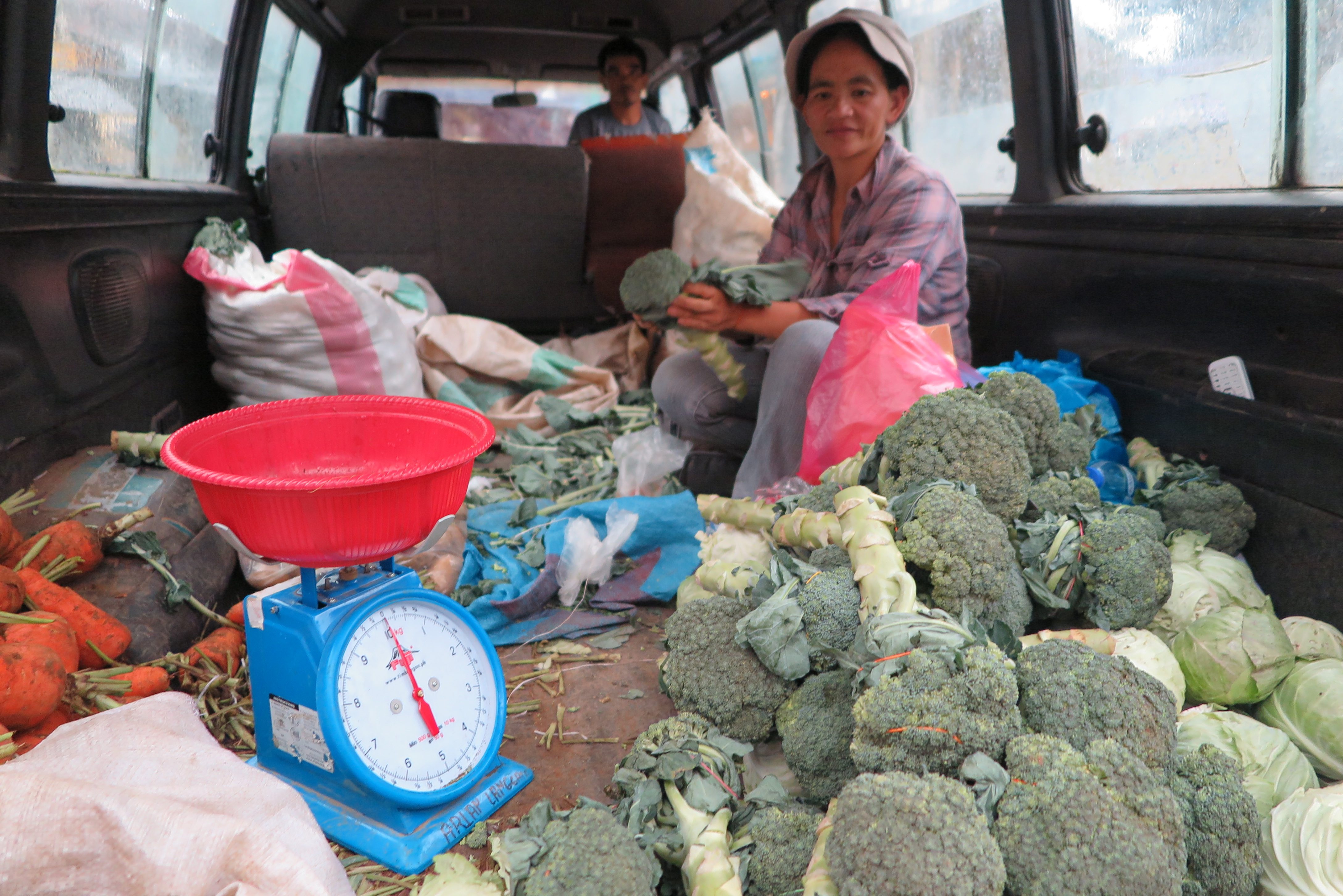
Experiential travels
So why does social tourism resonate with millennials?
Millennials embrace being known as the travel generation. In a 2016 report , AirBnB predicted that by the year 2025, millennials would comprise 75% of all travelers.
The same study also showed that amongst those interviewed, more than 70% of respondents identified travel as being an essential component of their being. And it shows – the average millennial takes approximately three or four trips a year.
But as these numbers increase, the consumer landscape and their preferences also change.
More and more are craving a deeper authenticity rather than trips that bring back mere souvenirs or photographs. Millennials choose to experience and learn about their destinations by getting close to the locale as possible. And this means getting more personal, going off-script, and not visiting worn-and-torn tourist spots.
Social tourism takes this insight and doubles-down on this undressed approach millennials seek.
With social tourism, you go down another layer. Beyond staying in a rented home — which is already the alternative to older generations’ choice of hotels — you stay in a local community, maybe even live with a host family.
More than local restaurants, or fast food chains you’re familiar with back home, you get to sit down and eat home-cooked meals you know money cannot always purchase.
These choices appeal to the millennial’s craving for discovery. In the same AirBnB survey above, it was noted that a majority of young travellers seek these hidden hotspots on purpose. Destinations are now the adult equivalent of those childhood secret nooks or off-the-path clearings one would guard against the rest of the world when they were young.
Wanderlust with a cause
Complementing authentic experiences is what is at the core of social tourism— social consciousness.
Millennials grew up in a world of globalization, economic disruption, and the internet. This gives us a different worldview from our predecessors, one that is more aware of our place on the global market and the social responsibility that comes with our consumption.
In Stefanie O’Connell’s book The Broke and Beautiful Life , she mentions how millennials are killing the diamond industry. This correlates to how millennials are aware of how problematic that industry could be — with issues of conflict and slavery.
The same sense of consciousness is what’s now being applied to travel. When we go on a trip, we’d rather share the fun than enjoy at somebody’s expense.
In social tours, that sharing is with the community itself. It’s less about exploitation and more of community empowerment.
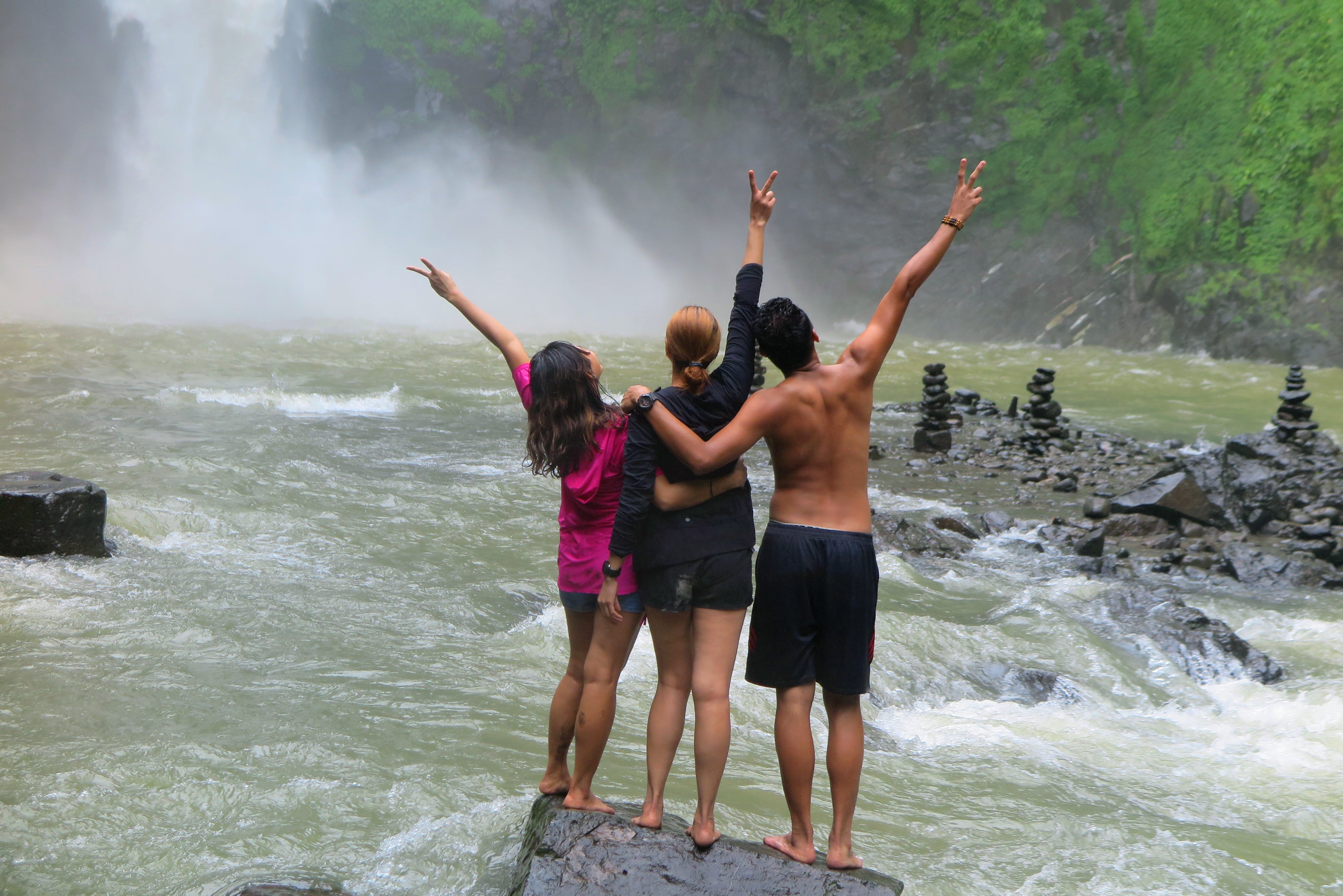
Authenticity and social conscience come together by not only grounding you but by making you feel your place in something much greater than yourself — a mission, a purpose.
‘Eat, Pray, Love-ing” is no longer enough, we want travels that are transformative not just for us but also the people, places, and the environment around us.
Sustainability and social tourism
It’s easy to dismiss the experience of social tourism as a mere oversell or blowing out of proportion the impact of spending a few hours, weeks at most, with a community. But these relationships started can go a long way, especially in the Philippines where social enterprise is a booming industry (some even hailing it as the “Silicon Valley” of social entrepreneurship).
Social enterprises that have been making waves include: Kandama , which creates fashion that incorporates the hand-loomed fabrics made by the indigenous weavers of Kiangan, Ifugao; as well as social tourism enterprises like Make a Difference Travels (MAD Travels) and Meaningful Travels PH who have respective partner communities around the country.
For many indigenous communities, it is this forming of sustainable relationships with social tourism groups that enable their day-to-day lives even more — from the skills sharing to the income generation.
“Voluntourism,” responsible tourism, transformative travel; as the practice grows, so do the names it goes by. But at its heart, the idea remains the same. Social tourism is about making travels much more meaningful. – Rappler.com

Locally Blended Juice Drinks are unique drinks that come from indigenous fruits sourced from the rich and colorful Filipino soil (We had 7,107 islands to choose from). All are seriously good, but not seriously named. 100% made Locally , 100% made responsibly.
Add a comment
Please abide by Rappler's commenting guidelines .
There are no comments yet. Add your comment to start the conversation.
How does this make you feel?
Related Topics

Tristan Zinampan
Recommended stories, {{ item.sitename }}, {{ item.title }}.
Checking your Rappler+ subscription...
Upgrade to Rappler+ for exclusive content and unlimited access.
Why is it important to subscribe? Learn more
You are subscribed to Rappler+
Social Tourism: What Is It and How Does It Work?
December 12, 2022
Mark Miller
Social tourism can be defined as where travelers visit places to immerse themselves in culture, history, architecture, etc. They travel to these areas to interact with and learn more about that region’s people and traditions. It is an interaction between travelers and local people. Today, we’ll look over how social tourism is revolutionizing the future of travel.
What Is Social Tourism?
Social tourism has been around for a while, but the trend has just lately begun to take hold – at least locally.
Social tourism is a kind of tourism that takes visitors to local communities with the purpose of not only experiencing the moment but also helping the areas they visit.
This help can take the shape of volunteering, such as planting with locals or house-building; skill sharing through learning sessions between communities and their visitors; donations, via whatever the tourists bring; and income generation, as many social tourism organizations allot a portion of their tour fees to their partner community.
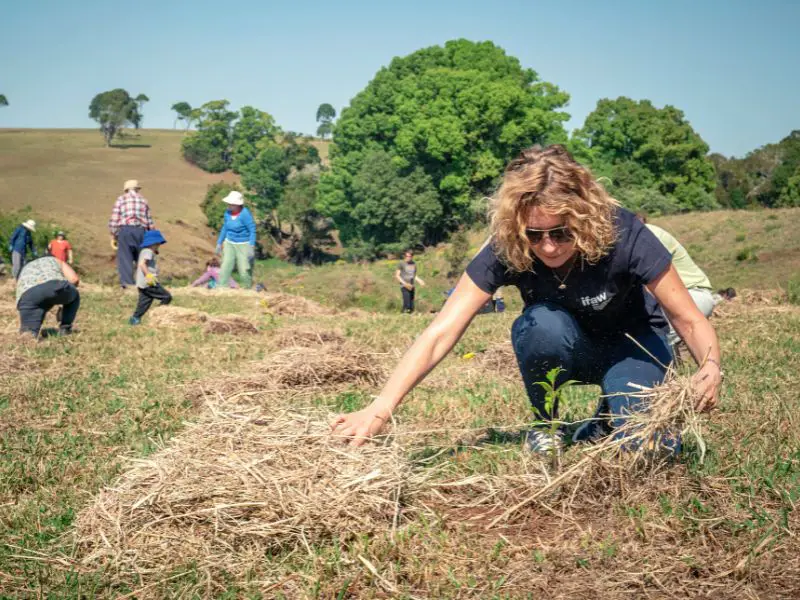
What Are the Goals of Social Tourism?
Social tourism is growing in popularity around the world. It aims to create positive change and development in developing countries through sustainable and responsible tourism. Here are some primary goals of social tourism:
- Supporting local communities: Creating jobs, family incomes, and new infrastructure for locals.
- Improving environmental and wildlife conservation: Social tourism fosters partnerships with local environmental and social conservation organizations, using its funds and support.
- Improving cultural relations: Social tourism advocates for peace between different cultures and nations, promoting understanding and cooperation between locals and travelers.
- Gain more knowledge about new cultures: Social tourism provides the opportunity to learn about different cultures and traditions, opening the traveler’s mind.
- Build better relationships: We hope that social tourism helps travelers improve their interpersonal skills through interactions with locals and each other.
- Think of social tourism as the best of both worlds – the adventures and excitement of traveling the world with the peace and solidarity of giving back to those in need.

Ways to Support Social Tourism
There are multiple ways to promote and support social tourism:
- Support charities and nonprofit organizations: Through social architecture organizations and charities and nonprofit organizations. These can be small local charities or big international ones.
- Volunteer in local communities: This is one of the most popular ways for travelers to give back to the communities they visit. From teaching English to building houses, there are opportunities for anyone to volunteer.
- Give donations: You can also donate money to organizations that support social tourism. By giving financially to these organizations, not only do you encourage their initiatives, but also you inspire many others to do the same.
- Avoid popular or overcrowded tourist places: The less popular the tourist sites are, the less crowded they are, and the more money goes to the locals in those areas.
- Using local transportation instead of taxis, cabs, or private buses will ensure that more money goes to the locals as well.
- Speak with representatives from your local government: Since the government pays for social travel activities, you can talk to the local representatives to find the best ways to support social tourism in your area.
- There is phenomenal change on the horizon for tourism and its sustainability worldwide – especially in developing countries. There’s no doubt that social tourism will become mainstream soon, so keep an eye out and support causes you believe in.
Supporting social tourism can be done without special effort on your part. Even modest adjustments to your usual travel routine might make a difference, such as staying with a host family rather than a hotel, purchasing gifts from local artists, dining at small local eateries, recycling while traveling, and more.

Sustainability and Social Tourism
For many indigenous communities, forming sustainable relationships with social tourism organizations improves their day-to-day life – from talent sharing to money generating.
“Voluntourism,” “responsible tourism,” and “transformative travel” are all labels given to the activity as it rises in popularity. But the core concept stays the same. The goal of social tourism is to make travel more meaningful.
Examples of Social Tourism Initiatives
International social tourism organisation (isto).
The International Social Tourism Organization (ISTO) was founded in 1963 and is one of the biggest (and oldest) social tourism nonprofits. It encourages responsible, accessible tourism for everyone, which benefits people and communities worldwide.
The organization’s key improvement objectives are as follows:
- Accessibility
- Fair business
- Environment
- Quality of life
ISTO’s mission is to make leisure, vacation, and tourism accessible to everyone, including kids, elders, individuals with disabilities, and others. It collaborates with local companies and governments to offer opportunities for everyone to experience unrestricted tourism while supporting and benefitting local inhabitants, native heritage, and the environment.
Responsible Travel
Responsible travel is a nonprofit organization dedicated to environmental protection and community empowerment. It emphasizes ethical travel, lowering carbon emissions, creating accessible travel possibilities, and arranging volunteer activities that enable you to reach out a helping hand to the places you visit.

Good Travel
Good travel encourages travel that has a beneficial social, economic, and environmental effect. To that aim, the group works with local companies that give back to their communities, collaborates with international nonprofit organizations, and offers to many worldwide charities.
Lough Ree Access For All
Through its wheelchair-accessible boat cruises, Lough Ree Access For All gives people who use wheelchairs the opportunity to enjoy life on the water, which many of us may take for granted. This illustrates how social tourism may function as an approach to social tourism.
Author Notes
Social Tourism is more than just your run-of-the-mill travel. The word “social” may describe tourists who stay in homestays or visit small towns and villages to taste the local lifestyle. But social travel is much more than that. Social travel can, for people willing to consider it, change their lives and the lives of others.
Social tourism provides travelers with authentic local experiences while helping the communities they visit to improve their lives. Whether through volunteering, donations, or providing jobs, social tourism creates positive impacts worldwide. Do you participate in social tourism? Is this something you should explore when traveling? Why (or why not)? Let us know in the comments below!
You can find eco-friendly guides here: Sustainable Backpacks , Gifts for Vegans , Affordable and Sustainable Clothing Brands
Leave a Comment Cancel reply
Save my name, email, and website in this browser for the next time I comment.

Eco-Friendly Tips & Advice Gardening & Permaculture
Sustainable Energy New Eco-Friendly Technologies
UN Tourism | Bringing the world closer

- SUSTAINABLE DEVELOPMENT
- Competitiveness
- Innovation and Investments
- ETHICS, CULTURE AND SOCIAL RESPONSIBILITY
- TECHNICAL COOPERATION
- UN Tourism ACADEMY
share this content
- Share this article on facebook
- Share this article on twitter
- Share this article on linkedin
Ethics, Culture and Social Responsibility
The Ethics, Culture and Social Responsibility Department of the World Tourism Organization (UN Tourism), a specialised agency of the United Nations, is tasked with the promotion of responsible, sustainable and universally accessible tourism.
Global Code of Ethics for Tourism

UN Tourism is guided by the belief that tourism can make a meaningful contribution to people’s lives and our planet. This conviction is at the very heart of the Global Code of Ethics for Tourism, a roadmap for tourism development towards a more ethical approach.
Accessible Tourism

According to the World Health Organization (WHO), 16% of the world’s population (1.3 billion people) is estimated to live with some form of disability. UN Tourism is convinced that accessibility for all to tourist facilities, products, and services should be a central part of any responsible and sustainable tourist policy.
Tourism and Culture

Cultural tourism is a type of tourism activity in which the visitor’s essential motivation is to learn, discover, experience and consume the tangible and intangible cultural attractions/products in a tourism destination. These attractions/products relate to a set of distinctive material, intellectual, spiritual and emotional features of a society that encompasses arts and architecture, historical and cultural heritage, culinary heritage, literature, music, creative industries and the living cultures with their lifestyles, value systems, beliefs and traditions.
Women’s Empowerment and Tourism

Tourism has the potential to contribute to greater gender equality and the empowerment of women, in line with Sustainable Development Goal 5. The majority of people employed in tourism worldwide are women, both in formal and informal jobs. Tourism offers women opportunities for income-generation and entrepreneurship. However, women are concentrated in the lowest paid, lowest skilled sectors of the industry and carry out a large amount of unpaid work in family tourism businesses.
- Subject List
- Take a Tour
- For Authors
- Subscriber Services
- Publications
- African American Studies
- African Studies
- American Literature
- Anthropology
- Architecture Planning and Preservation
- Art History
- Atlantic History
- Biblical Studies
- British and Irish Literature
- Childhood Studies
- Chinese Studies
- Cinema and Media Studies
- Communication
- Criminology
- Environmental Science
- Evolutionary Biology
- International Law
- International Relations
- Islamic Studies
- Jewish Studies
- Latin American Studies
- Latino Studies
- Linguistics
- Literary and Critical Theory
- Medieval Studies
- Military History
- Political Science
- Public Health
- Renaissance and Reformation
- Social Work
- Urban Studies
- Victorian Literature
- Browse All Subjects
How to Subscribe
- Free Trials
In This Article Expand or collapse the "in this article" section Sociology of Tourism
Introduction, general overviews.
- Anthologies, Edited Collections, and Review Articles
- Evolutionary Sociology Perspectives in Tourism
- Neo-Durkheimian Perspectives in Tourism
- Marxist and Critical Theory Perspectives in Tourism
- Functionalist Perspectives in Tourism
- Weberian Perspectives
- Formalism and Phenomenological Perspectives in Tourism
- Symbolic Interactionist Perspectives in Tourism
- Bourdieusian and Practice-Based Theory Perspectives in Tourism
- Contemporary Sociology of Tourism in the Post-truth Era
Related Articles Expand or collapse the "related articles" section about
About related articles close popup.
Lorem Ipsum Sit Dolor Amet
Vestibulum ante ipsum primis in faucibus orci luctus et ultrices posuere cubilia Curae; Aliquam ligula odio, euismod ut aliquam et, vestibulum nec risus. Nulla viverra, arcu et iaculis consequat, justo diam ornare tellus, semper ultrices tellus nunc eu tellus.
- Collective Memory
- Consumer Culture
- Empires and Colonialism
- Historic Preservation
- Sociology of Culture
Other Subject Areas
Forthcoming articles expand or collapse the "forthcoming articles" section.
- Consumer Credit and Debt
- Global Inequalities
- LGBTQ+ Spaces
- Find more forthcoming articles...
- Export Citations
- Share This Facebook LinkedIn Twitter
Sociology of Tourism by Erdinç Çakmak LAST MODIFIED: 23 August 2022 DOI: 10.1093/obo/9780199756384-0263
The sociology of tourism studies tourists’ relationships, roles, and motivations and the ongoing exchange among tourists, institutions, and host communities. Tourism cannot be treated in isolation since it embodies all tourism practices in a system they operate in. Thus, tourism is a complex sociocultural, economic, and political phenomenon and touches all levels of society. The investigation of tourism’s role in society, the tourism system’s effects on nature, tourism spaces, objects, practices, relationships, and the tourist typologies demand systematic sociological investigations. A researcher needs to consider the whole macro system through its members’ social, political, cultural, and economic interactions. In such a social context, both human and nonhuman actors continuously shape and reshape the tourism system, and the tourism system reshapes these actors’ values, attitudes, and behaviors. Researchers examining the sociology of tourism departed from several theoretical Perspectives , blended theory and method, and focused on sociological concepts to understand and explain the different aspects of tourism. This group of scholars has been working within the several cores of sociology (e.g., education, family, economy, development, religion, gender, language, migration, social inequalities, labor, art) and at the margins of emerging interdisciplinary formations, including those crossing many disciplines such as geography, anthropology, economics, political science, psychology, marketing, communication, women’s studies, history, and cultural studies. The sociology of tourism studies engendered transdisciplinary conversations both in academia and in practice, and the results of these studies have created pragmatic changes in tourism practices, habits, and governance.
Five scholars, judging from the Google Scholar citation counts of their critical works on the sociology of tourism, have contributed to the field in an original and pioneering way. These leading scholars’ abundant and consistent publications have provided the foundation for a sociological approach to tourism. They can be called the established leaders of the sociology of tourism, and are listed here alphabetically: Erik Cohen, Graham Dann, Marie-Françoise Lanfant, Dean MacCannell, and John Urry. Cohen 1972 opposed treating tourists as a homogenous mass and provided a heuristic tourist typology ranging from familiarity to strangeness. Later, Cohen 1984 classified tourism’s sociology into four main areas: tourist as a traveler, tourists’ relationships with hosts, the tourism system, and tourism impacts. MacCannell’s 1973 seminal article on staged authenticity spotlighted the relationship between tourism and (Western) modernity, which became an essential research agenda for the sociology of tourism in the last quarter of the twentieth century. MacCannell 1976 argued that alienated modern tourists are motivated by a quest for authenticity in their travels, but this quest is thwarted through a “staged authenticity” offered by host communities. Dann 1977 sought to answer the question “what makes tourists travel?” and employed the themes of anomie and collective representations in the sociology of tourism research. He combined anomie with status enhancement in a motivational study of tourists and provided the first empirical results of the presentation and profiles of anomic tourists. Besides this approach, Dann 1996 took a sociolinguistic approach and examined the promotional counterpart of tourist motivations in “the language of tourism” using semiotic analyses. Lanfant 1980 emphasized the international dimension of tourism. She argued that tourism is a “total social phenomenon” which challenges identity formation. Lanfant, et al. 1995 transcended the dichotomy between seeing tourism as either business or not business and suggested a novel approach reflecting the fundamental level of reality in tourism practice. Urry 1990 introduced Foucault’s concept of “gaze” into tourism discourse. Urry prioritized the visual sense of gaze and distinguished the tourist gaze as “romantic” and “collective” without concerning other Foucauldian issues of power and authority. By introducing the concept “gaze” into tourism, Urry made a crucial theoretical opening in the sociology of tourism, and other scholars followed him by focusing further on the body and other senses. Later in the decade, Urry 1999 proposed studying journeys, connections, and flows (both physical and virtual movements) as mobile theories and mobile methods and that this be placed at the top of the research agenda.
Cohen, E. 1972. Toward a sociology of international tourism. Social Research 39:64–82.
This article stresses the travel dimension of tourism and devises tourist typologies along a continuum from familiarity to strangeness. It emphasizes the differences among tourists and calls for further examination of their travel types’ attitudes, motivations, and behavior.
Cohen, E. 1984. The sociology of tourism: Approaches, issues, and findings. Annual Review of Sociology 10.1: 373–392.
DOI: 10.1146/annurev.so.10.080184.002105
This is a crucial academic text for understanding the classification of the sociology of tourism. Cohen classifies tourism into four main areas: tourists, their interaction with hosts, the tourism system, and tourism impacts. Following this article, scholars have given more attention to systematic empirical research in the field.
Dann, G. M. 1977. Anomie, ego-enhancement and tourism. Annals of Tourism Research 4.4: 184–194.
DOI: 10.1016/0160-7383(77)90037-8
This paper maintains that tourists’ anomie (i.e., absence of the general societal and ethical standards) needs to be investigated at the pre-travel level. This sociopsychological research is the first empirical research of tourists’ attitudes and behavior and it provides a firmer theoretical and empirical footing to the literature on tourist profiles.
Dann, G. M. 1996. The language of tourism: A sociolinguistic perspective . Wallingford, UK: CAB International.
This book analyzes the verbal framing of tourists’ experiences. Paradigms on social control, the tourist as a child, and the tourism media from the printed word to television screen have been brought together with semiotic analyses at a quality level.
Lanfant, M. F. 1980. Introduction: Tourism in the process of internationalisation. International Social Science Journal 32.1: 14–43.
This article captures the multipolarity of tourism as a particular form of consumption. The author provides insights into world tourism organizations and the role of international bodies and tour operators by using the methodological principles of systems analysis.
Lanfant, M. F., J. B. Allcock, and E. M. Bruner, eds. 1995. International tourism: Identity and change . London: SAGE.
This book offers a novel approach in examining how tourism transcends individual societies and has become an international fact. It emphasizes the necessity of understanding the local and global developments simultaneously. The volume argues that local social practices cannot be understood independently of the global, and that the global practices are never independent of the local setting in which they operate.
MacCannell, D. 1973. Staged authenticity: Arrangements of social space in tourist settings. American Journal of Sociology 79.3: 589–603.
DOI: 10.1086/225585
This academic article and the ensuing book have dominated the discussions in the sociology of tourism in the last quarter of the twentieth century. This study describes the alienation of Western tourists and their search for authentic experiences in other times and places while hosts modify a cultural practice for tourism.
MacCannell, D. 1976. The tourist: A new theory of the leisure class . New York: Schocken.
This is the most influential book in the sociology of tourism and it portrays the role of tourists in postindustrial society. Tourists seek meanings to their deepest longings and travel as pilgrims to the secular world, paying homage to various attractions that are symbols of modernity.
Urry, J. 1990. The tourist gaze: Leisure and travel in contemporary societies . London: SAGE.
This book takes a postmodernist perspective and describes the foundation of tourist behavior in the form of a tourist gaze. Here tourism becomes a performance and acts as a central element in the broad cultural changes in contemporary society.
Urry, J. 1999. Sociology beyond societies: Mobilities for the twenty-first century . London: Routledge.
In this book, Urry suggests the necessity of replacing the examination of society as the traditional basis of sociology from bounded clusters and objects of a region to networks and fluids in the borderless world. The book studies the physical and virtual movements of people, ideas, messages, money, and waste products across international borders.
back to top
Users without a subscription are not able to see the full content on this page. Please subscribe or login .
Oxford Bibliographies Online is available by subscription and perpetual access to institutions. For more information or to contact an Oxford Sales Representative click here .
- About Sociology »
- Meet the Editorial Board »
- Actor-Network Theory
- Adolescence
- African Americans
- African Societies
- Agent-Based Modeling
- Analysis, Spatial
- Analysis, World-Systems
- Anomie and Strain Theory
- Arab Spring, Mobilization, and Contentious Politics in the...
- Asian Americans
- Assimilation
- Authority and Work
- Bell, Daniel
- Biosociology
- Bourdieu, Pierre
- Catholicism
- Causal Inference
- Chicago School of Sociology
- Chinese Cultural Revolution
- Chinese Society
- Citizenship
- Civil Rights
- Civil Society
- Cognitive Sociology
- Cohort Analysis
- Collective Efficacy
- Comparative Historical Sociology
- Comte, Auguste
- Conflict Theory
- Conservatism
- Consumption
- Contemporary Family Issues
- Contingent Work
- Conversation Analysis
- Corrections
- Cosmopolitanism
- Crime, Cities and
- Cultural Capital
- Cultural Classification and Codes
- Cultural Economy
- Cultural Omnivorousness
- Cultural Production and Circulation
- Culture and Networks
- Culture, Sociology of
- Development
- Discrimination
- Doing Gender
- Du Bois, W.E.B.
- Durkheim, Émile
- Economic Institutions and Institutional Change
- Economic Sociology
- Education and Health
- Education Policy in the United States
- Educational Policy and Race
- Entrepreneurship
- Environmental Sociology
- Epistemology
- Ethnic Enclaves
- Ethnomethodology and Conversation Analysis
- Exchange Theory
- Families, Postmodern
- Family Policies
- Feminist Theory
- Field, Bourdieu's Concept of
- Forced Migration
- Foucault, Michel
- Frankfurt School
- Gender and Bodies
- Gender and Crime
- Gender and Education
- Gender and Health
- Gender and Incarceration
- Gender and Professions
- Gender and Social Movements
- Gender and Work
- Gender Pay Gap
- Gender, Sexuality, and Migration
- Gender Stratification
- Gender, Welfare Policy and
- Gendered Sexuality
- Gentrification
- Gerontology
- Globalization and Labor
- Goffman, Erving
- Human Trafficking
- Immigration
- Indian Society, Contemporary
- Institutions
- Intellectuals
- Intersectionalities
- Interview Methodology
- Job Quality
- Knowledge, Critical Sociology of
- Labor Markets
- Latino/Latina Studies
- Law and Society
- Law, Sociology of
- LGBT Parenting and Family Formation
- LGBT Social Movements
- Life Course
- Lipset, S.M.
- Markets, Conventions and Categories in
- Marriage and Divorce
- Marxist Sociology
- Masculinity
- Mass Incarceration in the United States and its Collateral...
- Material Culture
- Mathematical Sociology
- Medical Sociology
- Mental Illness
- Methodological Individualism
- Middle Classes
- Military Sociology
- Money and Credit
- Multiculturalism
- Multilevel Models
- Multiracial, Mixed-Race, and Biracial Identities
- Nationalism
- Non-normative Sexuality Studies
- Occupations and Professions
- Organizations
- Panel Studies
- Parsons, Talcott
- Political Culture
- Political Economy
- Political Sociology
- Popular Culture
- Proletariat (Working Class)
- Protestantism
- Public Opinion
- Public Space
- Qualitative Comparative Analysis (QCA)
- Race and Sexuality
- Race and Violence
- Race and Youth
- Race in Global Perspective
- Race, Organizations, and Movements
- Rational Choice
- Relationships
- Religion and the Public Sphere
- Residential Segregation
- Revolutions
- Role Theory
- Rural Sociology
- Scientific Networks
- Secularization
- Sequence Analysis
- Sex versus Gender
- Sexual Identity
- Sexualities
- Sexuality Across the Life Course
- Simmel, Georg
- Single Parents in Context
- Small Cities
- Social Capital
- Social Change
- Social Closure
- Social Construction of Crime
- Social Control
- Social Darwinism
- Social Disorganization Theory
- Social Epidemiology
- Social History
- Social Indicators
- Social Mobility
- Social Movements
- Social Network Analysis
- Social Networks
- Social Policy
- Social Problems
- Social Psychology
- Social Stratification
- Social Theory
- Socialization, Sociological Perspectives on
- Sociolinguistics
- Sociological Approaches to Character
- Sociological Research on the Chinese Society
- Sociological Research, Qualitative Methods in
- Sociological Research, Quantitative Methods in
- Sociology, History of
- Sociology of Manners
- Sociology of Music
- Sociology of War, The
- Suburbanism
- Survey Methods
- Symbolic Boundaries
- Symbolic Interactionism
- The Division of Labor after Durkheim
- Tilly, Charles
- Time Use and Childcare
- Time Use and Time Diary Research
- Tourism, Sociology of
- Transnational Adoption
- Unions and Inequality
- Urban Ethnography
- Urban Growth Machine
- Urban Inequality in the United States
- Veblen, Thorstein
- Visual Arts, Music, and Aesthetic Experience
- Wallerstein, Immanuel
- Welfare, Race, and the American Imagination
- Welfare States
- Women’s Employment and Economic Inequality Between Househo...
- Work and Employment, Sociology of
- Work/Life Balance
- Workplace Flexibility
- Privacy Policy
- Cookie Policy
- Legal Notice
- Accessibility
Powered by:
- [66.249.64.20|185.66.15.189]
- 185.66.15.189
Sustainable tourism
Related sdgs, promote sustained, inclusive and sustainable ....

Description
Publications.
Tourism is one of the world's fastest growing industries and an important source of foreign exchange and employment, while being closely linked to the social, economic, and environmental well-being of many countries, especially developing countries. Maritime or ocean-related tourism, as well as coastal tourism, are for example vital sectors of the economy in small island developing States (SIDS) and coastal least developed countries (LDCs) (see also: The Potential of the Blue Economy report as well as the Community of Ocean Action on sustainable blue economy).
The World Tourism Organization defines sustainable tourism as “tourism that takes full account of its current and future economic, social and environmental impacts, addressing the needs of visitors, the industry, the environment and host communities".
Based on General assembly resolution 70/193, 2017 was declared as the International Year of Sustainable Tourism for Development.
In the 2030 Agenda for Sustainable Development SDG target 8.9, aims to “by 2030, devise and implement policies to promote sustainable tourism that creates jobs and promotes local culture and products”. The importance of sustainable tourism is also highlighted in SDG target 12.b. which aims to “develop and implement tools to monitor sustainable development impacts for sustainable tourism that creates jobs and promotes local culture and products”.
Tourism is also identified as one of the tools to “by 2030, increase the economic benefits to Small Island developing States and least developed countries” as comprised in SDG target 14.7.
In the Rio+20 outcome document The Future We want, sustainable tourism is defined by paragraph 130 as a significant contributor “to the three dimensions of sustainable development” thanks to its close linkages to other sectors and its ability to create decent jobs and generate trade opportunities. Therefore, Member States recognize “the need to support sustainable tourism activities and relevant capacity-building that promote environmental awareness, conserve and protect the environment, respect wildlife, flora, biodiversity, ecosystems and cultural diversity, and improve the welfare and livelihoods of local communities by supporting their local economies and the human and natural environment as a whole. ” In paragraph 130, Member States also “call for enhanced support for sustainable tourism activities and relevant capacity-building in developing countries in order to contribute to the achievement of sustainable development”.
In paragraph 131, Member States “encourage the promotion of investment in sustainable tourism, including eco-tourism and cultural tourism, which may include creating small- and medium-sized enterprises and facilitating access to finance, including through microcredit initiatives for the poor, indigenous peoples and local communities in areas with high eco-tourism potential”. In this regard, Member States also “underline the importance of establishing, where necessary, appropriate guidelines and regulations in accordance with national priorities and legislation for promoting and supporting sustainable tourism”.
In 2002, the World Summit on Sustainable Development in Johannesburg called for the promotion of sustainable tourism development, including non-consumptive and eco-tourism, in Chapter IV, paragraph 43 of the Johannesburg Plan of Implementation.
At the Johannesburg Summit, the launch of the “Sustainable Tourism – Eliminating Poverty (ST-EP) initiative was announced. The initiative was inaugurated by the World Tourism Organization, in collaboration with UNCTAD, in order to develop sustainable tourism as a force for poverty alleviation.
The UN Commission on Sustainable Development (CSD) last reviewed the issue of sustainable tourism in 2001, when it was acting as the Preparatory Committee for the Johannesburg Summit.
The importance of sustainable tourism was also mentioned in Agenda 21.
For more information and documents on this topic, please visit this link
UNWTO Annual Report 2015
2015 was a landmark year for the global community. In September, the 70th Session of the United Nations General Assembly adopted the Sustainable Development Goals (SDGs), a universal agenda for planet and people. Among the 17 SDGs and 169 associated targets, tourism is explicitly featured in Goa...
UNWTO Annual Report 2016
In December 2015, the United Nations General Assembly declared 2017 as the International Year of Sustainable Tourism for Development. This is a unique opportunity to devote a year to activities that promote the transformational power of tourism to help us reach a better future. This important cele...
Emerging Issues for Small Island Developing States
The 2012 UNEP Foresight Process on Emerging Global Environmental Issues primarily identified emerging environmental issues and possible solutions on a global scale and perspective. In 2013, UNEP carried out a similar exercise to identify priority emerging environmental issues that are of concern to ...
Transforming our World: The 2030 Agenda for Sustainable Development
This Agenda is a plan of action for people, planet and prosperity. It also seeks to strengthen universal peace in larger freedom, We recognize that eradicating poverty in all its forms and dimensions, including extreme poverty, is the greatest global challenge and an indispensable requirement for su...
15 Years of the UNWTO World Tourism Network on Child Protection: A Compilation of Good Practices
Although it is widely recognized that tourism is not the cause of child exploitation, it can aggravate the problem when parts of its infrastructure, such as transport networks and accommodation facilities, are exploited by child abusers for nefarious ends. Additionally, many other factors that contr...
Towards Measuring the Economic Value of Wildlife Watching Tourism in Africa
Set against the backdrop of the ongoing poaching crisis driven by a dramatic increase in the illicit trade in wildlife products, this briefing paper intends to support the ongoing efforts of African governments and the broader international community in the fight against poaching. Specifically, this...
Status and Trends of Caribbean Coral Reefs: 1970-2012
Previous Caribbean assessments lumped data together into a single database regardless of geographic location, reef environment, depth, oceanographic conditions, etc. Data from shallow lagoons and back reef environments were combined with data from deep fore-reef environments and atolls. Geographic c...
Natural Resources Forum: Special Issue Tourism
The journal considers papers on all topics relevant to sustainable development. In addition, it dedicates series, issues and special sections to specific themes that are relevant to the current discussions of the United Nations Commission on Sustainable Development (CSD)....
Thailand: Supporting Sustainable Development in Thailand: A Geographic Clusters Approach
Market forces and government policies, including the Tenth National Development Plan (2007-2012), are moving Thailand toward a more geographically specialized economy. There is a growing consensus that Thailand’s comparative and competitive advantages lie in amenity services that have high reliance...
Road Map on Building a Green Economy for Sustainable Development in Carriacou and Petite Martinique, Grenada
This publication is the product of an international study led by the Division for Sustainable Development (DSD) of the United Nations Department of Economic and Social Affairs (UNDESA) in cooperation with the Ministry of Carriacou and Petite Martinique Affairs and the Ministry of Environment, Foreig...
Natural Resources Forum, a United Nations Sustainable Development Journal (NRF)
Natural Resources Forum, a United Nations Sustainable Development Journal, seeks to address gaps in current knowledge and stimulate relevant policy discussions, leading to the implementation of the sustainable development agenda and the achievement of the Sustainable...
UN Ocean Conference 2025
Our Ocean, Our Future, Our Responsibility “The ocean is fundamental to life on our planet and to our future. The ocean is an important source of the planet’s biodiversity and plays a vital role in the climate system and water cycle. The ocean provides a range of ecosystem services, supplies us with
UN Ocean Conference 2022
The UN Ocean Conference 2022, co-hosted by the Governments of Kenya and Portugal, came at a critical time as the world was strengthening its efforts to mobilize, create and drive solutions to realize the 17 Sustainable Development Goals by 2030.
58th Session of the Commission for Social Development – CSocD58
22nd general assembly of the united nations world tourism organization, world tourism day 2017 official celebration.
This year’s World Tourism Day, held on 27 September, will be focused on Sustainable Tourism – a Tool for Development. Celebrated in line with the 2017 International Year of Sustainable Tourism for Development, the Day will be dedicated to exploring the contribution of tourism to the Sustainable Deve
World Tourism Day 2016 Official Celebration
Accessible Tourism for all is about the creation of environments that can cater for the needs of all of us, whether we are traveling or staying at home. May that be due to a disability, even temporary, families with small children, or the ageing population, at some point in our lives, sooner or late
4th Global Summit on City Tourism
The World Tourism Organisation (UNWTO) and the Regional Council for Tourism of Marrakesh with support of the Government of Morroco are organizing the 4th Global Summit on City Tourism in Marrakesh, Morroco (9-10 December 2015). International experts in city tourism, representatives of city DMOs, of
2nd Euro-Asian Mountain Resorts Conference
The World Tourism Organisation (UNWTO) and Ulsan Metropolitan City with support of the Government of the Republic of Korea are organizing the 2nd Euro-Asian Mountain Resorts Conference, in Ulsan, Republic of Korea (14 - 16 October 2015). Under the title “Paving the Way for a Bright Future for Mounta
21st General Assembly of the United Nations World Tourism Organization
Unwto regional conference enhancing brand africa - fostering tourism development.
Tourism is one of the Africa’s most promising sectors in terms of development, and represents a major opportunity to foster inclusive development, increase the region’s participation in the global economy and generate revenues for investment in other activities, including environmental preservation.
- January 2017 International Year of Tourism In the context of the universal 2030 Agenda for Sustainable Development and the Sustainable Development Goals (SDGs), the International Year aims to support a change in policies, business practices and consumer behavior towards a more sustainable tourism sector that can contribute to the SDGs.
- January 2015 Targets 8.9, 12 b,14.7 The 2030 Agenda for Sustainable Development commits Member States, through Sustainable Development Goal Target 8.9 to “devise and implement policies to promote sustainable tourism that creates jobs and promotes local culture and products”. The importance of sustainable tourism, as a driver for jobs creation and the promotion of local culture and products, is also highlighted in Sustainable Development Goal target 12.b. Tourism is also identified as one of the tools to “increase [by 2030] the economic benefits to Small Island developing States and least developed countries”, through Sustainable Development Goals Target 14.7.
- January 2012 Future We Want (Para 130-131) Sustainable tourism is defined as a significant contributor “to the three dimensions of sustainable development” thanks to its close linkages to other sectors and its ability to create decent jobs and generate trade opportunities. Therefore, Member States recognize “the need to support sustainable tourism activities and relevant capacity-building that promote environmental awareness, conserve and protect the environment, respect wildlife, flora, biodiversity, ecosystems and cultural diversity, and improve the welfare and livelihoods of local communities” as well as to “encourage the promotion of investment in sustainable tourism, including eco-tourism and cultural tourism, which may include creating small and medium sized enterprises and facilitating access to finance, including through microcredit initiatives for the poor, indigenous peoples and local communities in areas with high eco-tourism potential”.
- January 2009 Roadmap for Recovery UNWTO announced in March 2009 the elaboration of a Roadmap for Recovery to be finalized by UNWTO’s General Assembly, based on seven action points. The Roadmap includes a set of 15 recommendations based on three interlocking action areas: resilience, stimulus, green economy aimed at supporting the tourism sector and the global economy.
- January 2008 Global Sustainable Tourism Criteria The Global Sustainable Tourism Criteria represent the minimum requirements any tourism business should observe in order to ensure preservation and respect of the natural and cultural resources and make sure at the same time that tourism potential as tool for poverty alleviation is enforced. The Criteria are 41 and distributed into four different categories: 1) sustainability management, 2) social and economic 3) cultural 4) environmental.
- January 2003 WTO becomes a UN specialized body By Resolution 453 (XV), the Assembly agreed on the transformation of the WTO into a United Nations specialized body. Such transformation was later ratified by the United Nations General Assembly with the adoption of Resolution A/RES/58/232.
- January 2003 1st Int. Conf. on Climate Change and Tourism The conference was organized in order to gather tourism authorities, organizations, businesses and scientists to discuss on the impact that climate change can have on the tourist sector. The event took place from 9 till 11 April 2003 in Djerba, Tunisia.
- January 2002 World Ecotourism Summit Held in May 2002, in Quebec City, Canada, the Summit represented the most important event in the framework of the International Year of Ecosystem. The Summit identified as main themes: ecotourism policy and planning, regulation of ecotourism, product development, marketing and promotion of ecotourism and monitoring costs and benefits of ecotourism.
- January 1985 Tourism Bill of Rights and Tourist Code At the World Tourism Organization Sixth Assembly held in Sofia in 1985, the Tourism Bill of Rights and Tourist Code were adopted, setting out the rights and duties of tourists and host populations and formulating policies and action for implementation by states and the tourist industry.
- January 1982 Acapulco Document Adopted in 1982, the Acapulco Document acknowledges the new dimension and role of tourism as a positive instrument towards the improvement of the quality of life for all peoples, as well as a significant force for peace and international understanding. The Acapulco Document also urges Member States to elaborate their policies, plans and programmes on tourism, in accordance with their national priorities and within the framework of the programme of work of the World Tourism Organization.

13 Social impacts of tourism + explanations + examples
Disclaimer: Some posts on Tourism Teacher may contain affiliate links. If you appreciate this content, you can show your support by making a purchase through these links or by buying me a coffee . Thank you for your support!
Understanding the social impacts of tourism is vital to ensuring the sustainable management of the tourism industry. There are positive social impacts of tourism, demonstrating benefits to both the local community and the tourists. There are also negative social impacts of tourism.
In this article I will explain what the most common social impacts of tourism are and how these are best managed. At the end of the post I have also included a handy reading list for anybody studying travel and tourism or for those who are interested in learning more about travel and tourism management.
The social impacts of tourism
Preserving local culture, strengthening communities, provision of social services, commercialisation of culture and art, revitalisation of culture and art, preservation of heritage, social change, globalisation and the destruction of preservation and heritage, loss of authenticity , standardisation and commercialisation, culture clashes, tourist-host relationships, increase in crime, gambling and moral behaviour, social impacts of tourism: conclusion, social impacts of tourism- further reading.
Firstly, we need to understand what is meant by the term ‘social impacts of tourism’. I have covered this in my YouTube video below!
To put it simply, social impacts of tourism are;
“The effects on host communities of direct and indirect relations with tourists , and of interaction with the tourism industry”
This is also often referred to as socio-cultural impacts.
Tourism is, at its core, an interactive service. This means that host-guest interaction is inevitable. This can have significant social/socio-cultural impacts.
These social impacts can be seen as benefits or costs (good or bad). I will explain these below.

Positive social impacts of tourism
There are many social benefits of tourism, demonstrating positive social impacts. These might include; preserving the local culture and heritage; strengthening communities; provision of social services; commercialisation of culture and art; revitalisation of customs and art forms and the preservation of heritage.

It is the local culture that the tourists are often coming to visit.
Tourists visit Beijing to learn more about the Chinese Dynasties. Tourists visit Thailand to taste authentic Thai food. Tourists travel to Brazil to go to the Rio Carnival, to mention a few…
Many destinations will make a conserved effort to preserve and protect the local culture. This often contributes to the conservation and sustainable management of natural resources, the protection of local heritage, and a renaissance of indigenous cultures, cultural arts and crafts.
In one way, this is great! Cultures are preserved and protected and globalisation is limited. BUT, I can’t help but wonder if this is always natural? We don’t walk around in Victorian corsets or smoke pipes anymore…
Our social settings have changed immensely over the years. And this is a normal part of evolution! So is it right that we should try to preserve the culture of an area for the purposes of tourism? Or should we let them grow and change, just as we do? Something to ponder on I guess…
Tourism can be a catalyst for strengthening a local community.
Events and festivals of which local residents have been the primary participants and spectators are often rejuvenated and developed in response to tourist interest. I certainly felt this was the way when I went to the Running of the Bulls festival in Pamplona, Spain. The community atmosphere and vibe were just fantastic!

The jobs created by tourism can also be a great boost for the local community. Aside from the economic impacts created by enhanced employment prospects, people with jobs are happier and more social than those without a disposable income.
Local people can also increase their influence on tourism development, as well as improve their job and earnings prospects, through tourism-related professional training and development of business and organisational skills.
Read also: Economic leakage in tourism explained

The tourism industry requires many facilities/ infrastructure to meet the needs of the tourist. This often means that many developments in an area as a result of tourism will be available for use by the locals also.
Local people often gained new roads, new sewage systems, new playgrounds, bus services etc as a result of tourism. This can provide a great boost to their quality of life and is a great example of a positive social impact of tourism.
Tourism can see rise to many commercial business, which can be a positive social impact of tourism. This helps to enhance the community spirit as people tend to have more disposable income as a result.
These businesses may also promote the local cultures and arts. Museums, shows and galleries are fantastic way to showcase the local customs and traditions of a destination. This can help to promote/ preserve local traditions.

Some destinations will encourage local cultures and arts to be revitalised. This may be in the form of museum exhibitions, in the way that restaurants and shops are decorated and in the entertainment on offer, for example.
This may help promote traditions that may have become distant.
Many tourists will visit the destination especially to see its local heritage. It is for this reason that many destinations will make every effort to preserve its heritage.
This could include putting restrictions in place or limiting tourist numbers, if necessary. This is often an example of careful tourism planning and sustainable tourism management.
This text by Hyung You Park explains the principles of heritage tourism in more detail.
Negative social impacts of tourism
Unfortunately, there are a large number of socio-cultural costs on the host communities. These negative social impacts include; social change; changing values; increased crime and gambling; changes in moral behaviour; changes in family structure and roles; problems with the tourist-host relationship and the destruction of heritage.

Social change is basically referring to changes in the way that society acts or behaves. Unfortunately, there are many changes that come about as a result of tourism that are not desirable.
There are many examples throughout the world where local populations have changed because of tourism.
Perhaps they have changed the way that they speak or the way that they dress. Perhaps they have been introduced to alcohol through the tourism industry or they have become resentful of rich tourists and turned to crime. These are just a few examples of the negative social impacts of tourism.
Read also: Business tourism explained: What, why and where

Globalisation is the way in which the world is becoming increasingly connected. We are losing our individuality and gaining a sense of ‘global being’, whereby we are more and more alike than ever before.
Globalisation is inevitable in the tourism industry because of the interaction between tourists and hosts, which typically come from different geographic and cultural backgrounds. It is this interaction that encourage us to become more alike.
Here are some examples:
- When I went on the Jungle Book tour on my travels through Goa, the tourists were giving the Goan children who lived in the area sweets. These children would never have eaten such sweets should they not have come into contact with the tourists.
- When I travelled to The Gambia I met a local worker (known as a ‘ bumster ‘) who was wearing a Manchester United football top. When I asked him about it he told me that he was given the top by a tourist who visited last year. If it was not for said tourist, he would not have this top.
- In Thailand , many workers have exchanged their traditional work of plowing the fields to work in the cities, in the tourism industry. They have learnt to speak English and to eat Western food. If it were not for the tourists they would have a different line of work, they would not speak English and they would not choose to eat burger and chips for their dinner!
Many people believe globalisation to be a bad thing. BUT, there are also some positives. Think about this…
Do you want an ‘authentic’ squat toilet in your hotel bathroom or would you rather use a Western toilet? Are you happy to eat rice and curry for breakfast as the locals would do or do you want your cornflakes? Do you want to struggle to get by when you don’t speak the local language or are you pleased to find somebody who speaks English?
When we travel, most tourists do want a sense of ‘familiar’. And globalisation helps us to get that!

You can learn more about globalisation in this post- What is globalisation? A simple explanation .

Along similar lines to globalisation is the loss of authenticity that often results from tourism.
Authenticity is essentially something that is original or unchanged. It is not fake or reproduced in any way.
The Western world believe that a tourist destination is no longer authentic when their cultural values and traditions change. But I would argue is this not natural? Is culture suppose to stay the same or it suppose to evolve throughout each generation?
Take a look at the likes of the long neck tribe in Thailand or the Maasai Tribe in Africa. These are two examples of cultures which have remained ‘unchanged’ for the sole purpose of tourism. They appear not to have changed the way that they dress, they way that they speak or the way that they act in generations, all for the purpose of tourism.
To me, however, this begs the question- is it actually authentic? In fact, is this not the exact example of what is not authentic? The rest of the world have modern electricity and iPhones, they watch TV and buy their clothes in the nearest shopping mall. But because tourists want an ‘authentic’ experience, these people have not moved on with the rest of the world, but instead have remained the same.
I think there is also an ethical discussion to be had here, but I’ll leave that for another day…
You can learn more about what is authenticity in tourism here or see some examples of staged authenticity in this post.
Read also: Environmental impacts of tourism
Similarly, destinations risk standardisation in the process of satisfying tourists’ desires for familiar facilities and experiences.
While landscape, accommodation, food and drinks, etc., must meet the tourists’ desire for the new and unfamiliar, they must at the same time not be too new or strange because few tourists are actually looking for completely new things (think again about the toilet example I have previously).
Tourists often look for recognisable facilities in an unfamiliar environment, like well-known fast-food restaurants and hotel chains. Tourist like some things to be standardised (the toilet, their breakfast, their drinks, the language spoken etc), but others to be different (dinner options, music, weather, tourist attractions etc).
Do we want everything to become ‘standardised’ though? I know I miss seeing the little independent shops that used to fill the high streets in the UK. Now it’s all chains and multinational corporations. Sure, I like Starbucks (my mug collection is coming on quite nicely!), but I also love the way that there are no Starbucks in Italy. There’s something great about trying out a traditional, yet unfamiliar coffee shop, or any independant place for that matter.
I personally think that tourism industry stakeholders should proceed with caution when it comes to ‘standardisation’. Sure, give the tourists that sense of familiar that they are looking for. But don’t dilute the culture and traditions of the destination that they are coming to visit, because if it feels too much like home….. well, maybe they will just stay at home next time? Just a little something to think about…

On a less philosophical note, another of the negative social impacts of tourism is that it can have significant consequences is culture clashes.
Because tourism involves movement of people to different geographical locations cultural clashes can take place as a result of differences in cultures, ethnic and religious groups, values, lifestyles, languages and levels of prosperity.
The attitude of local residents towards tourism development may unfold through the stages of euphoria, where visitors are very welcome, through apathy, irritation and potentially antagonism when anti-tourist attitudes begin to grow among local people. This is represented in Doxey’s Irritation Index, as shown below.
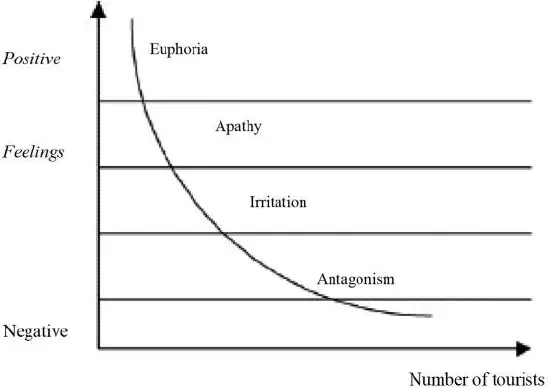
Culture clashes can also be exasperated by the fundamental differences in culture between the hosts and the tourists.
There is likely to be economic inequality between locals and tourists who are spending more than they usually do at home. This can cause resentment from the hosts towards the tourists, particularly when they see them wearing expensive jewellery or using plush cameras etc that they know they can’t afford themselves.
Further to this, tourists often, out of ignorance or carelessness, fail to respect local customs and moral values.
Think about it. Is it right to go topless on a beach if within the local culture it is unacceptable to show even your shoulders?
There are many examples of ways that tourists offend the local population , often unintentionally. Did you know that you should never put your back to a Buddha? Or show the sole of your feet to a Thai person? Or show romantic affection in public in the Middle East?
A little education in this respect could go a long way, but unfortunately, many travellers are completely unaware of the negative social impacts that their actions may have.
The last of the social impacts of tourism that I will discuss is crime, gambling and moral behaviour. Crime rates typically increase with the growth and urbanisation of an area and the growth of mass tourism is often accompanied by increased crime.
The presence of a large number of tourists with a lot of money to spend and often carrying valuables such as cameras and jewellery increases the attraction for criminals and brings with it activities like robbery and drug dealing.
Although tourism is not the cause of sexual exploitation, it provides easy access to it e.g. prostitution and sex tourism . Therefore, tourism can contribute to rises in the numbers of sex workers in a given area. I have seen this myself in many places including The Gambia and Thailand .
Lastly, gambling is a common occurrence as a result of tourism. Growth of casinos and other gambling facilities can encourage not only the tourists to part with their cash, but also the local population .
As I have demonstrated in this post, there are many social impacts of tourism. Whilst some impacts are positive, most unfortunately are negative impacts.
Hopefully this post on the social impacts of tourism has helped you to think carefully about the impacts that your actions may have on the local community that you are visiting. I also hope that it has encouraged some deeper thinking with regards to issues such as globalisation, authenticity and standardisation.
If you are interested in learning more about topics such as this subscribe to my newsletter ! I send out travel tips, discount coupons and some material designed to get you thinking about the wider impacts of the tourism industry (like this post)- perfect for any tourism student or keen traveller!
As you can see, the social impacts of tourism are an important consideration for all industry stakeholders. Do you have any comments on the social impacts of tourism? Leave your comments below.
If you enjoyed this article on the social impacts of tourism, I am sure that you will love these too-
- Environmental impacts of tourism
- The 3 types of travel and tourism organisations
- 150 types of tourism! The ultimate tourism glossary
- 50 fascinating facts about the travel and tourism industry
Liked this article? Click to share!
- Barrierefreiheit
- Branchenbuch
- Behördenfinder
- Bus & Bahn
Fernwärme aus Abfällen in Müllverwertungsanlage Borsigstraße Bundesweit einmaliges Projekt in Betrieb
15. April 2024
Noch mehr klimafreundliche Fernwärme für Hamburg aus Abfällen der Stadt und dies zu stabilen Preisen: Energiesenator Jens Kerstan, Prof. Dr. Rüdiger Siechau, Geschäftsführer der Stadtreinigung Hamburg (SRH) und Michael Prinz, Geschäftsführer der Hamburger Energiewerke (HEnW) gaben heute den Startschuss zur vollständigen Inbetriebnahme des bundesweit einmaligen Wärmeprojektes in der Müllverwertungsanlage Borsigstraße (MVB).

Bundesweit einmaliges Projekt in Betrieb
Dieses innovative Projekt, das schon während des Baus mit dem „German Renewables Award 2021“ ausgezeichnet worden ist, steigert die Effizienz der Wärmeerzeugung ohne Brennstoff-Mehreinsatz und ohne Veränderung der Emissionsfracht erheblich und leistet somit einen weiteren großen Beitrag zur klimafreundlichen Wärmewende in Hamburg.
Jens Kerstan , Senator für Umwelt, Klima, Energie und Agrarwirtschaft: „Hamburg beweist erneut seine Vorreiterrolle im Bereich der Energiewende. Diese neue, zukunftsweisende Anlage der Stadtreinigung Hamburg ist ein Paradebeispiel für die Dekarbonisierung der Fernwärme und für die Zusammenarbeit unserer öffentlichen Unternehmen. Die HEnW wird diese Abfallwärme direkt in das Fernwärmenetz einspeisen und damit rund 35.000 Hamburger Haushalte versorgen. Jährlich werden dadurch 104.000 Tonnen CO2 eingespart. Mit der Inbetriebnahme der Anlage bringen wir nicht nur den Kohleaussteig im Heizkraftwerk Tiefstack voran, sondern machen einen großen Schritt auf unserem Weg zum endgültigen Kohleausstieg.“
Prof. Dr. Rüdiger Siechau, SRH-Geschäftsführer : „Mit diesem innovativen und in der Republik einzigartigen Wärmeprojekt werden wir einer der größten Lieferanten klimafreundlicher Wärme für Hamburg. Durch das gezielte Abkühlen von Rauchgasen sowie einer neuen Turbine stellen wir dem Hamburger Fernwärmenetz zusätzliche 350.000 MWh pro Jahr zur Verfügung. In diesem Projekt liefern wir mit dem Biomassekessel und den beiden Müllverbrennungslinien als erster sogenannter Dritteinspeiser, direkt Wärme in Form von Heißwasser in das Wärmenetz ein. Dadurch wird die autarke, sichere und stabile Versorgung mit klimafreundlicher Wärme weiter ausgebaut, was durch die jüngsten negativen Erfahrungen bei fossilen Energieträgern auch langfristig von besonderer Bedeutung sein dürfte. Dieses Projekt findet sowohl national als auch international große Anerkennung. Daher freuen wir uns jetzt mit der Gesamtinbetriebnahme zu einem erfolgreichen Abschluss gekommen zu sein.“
Michael Prinz , Geschäftsführer der Hamburger Energiewerke: „Die erweiterte Wärmelieferung der MVB zahlt direkt auf die Transformation unseres Heizkraftwerkes Tiefstack ein und ist ein wichtiger Schritt auf dem Weg zum Kohleausstieg. Dank der MVB können wir den Einsatz von fossilen Energieträgern unmittelbar reduzieren und unseren Kundinnen und Kunden im Stadtnetz schon heute mit einem erhöhten Anteil an klimaneutraler Wärme versorgen.“
Rückfragen der Medien Behörde für Umwelt, Klima, Energie und Agrarwirtschaft (BUKEA) Pressestelle Telefon: 040 42840 8006 E-Mail: [email protected]
Stadtreinigung Hamburg Kay Goetze E-Mail: [email protected] Telefon 040 2576-1010
Hamburger Energiewerke David Kappenberg E-Mail: [email protected] Telefon: 040 6396-2760
Themenübersicht auf hamburg.de
- Symbol für Politik & Verwaltung Politik & Verwaltung
- Symbol für Hotel & Tourismus Hotels & Tourismus
- Symbol für Erlebnis & Freizeit Erlebnis & Freizeit
- Symbol für Kultur & Tickets Kultur & Tickets
- Symbol für Jobs & Wohnen Jobs & Wohnen
- Symbol für Verkehr Verkehr
- Symbol für Barrierefreiheit Barrierefreiheit
Presseservice

Medien Datenbank
Fotos und Videos von aktuellen Terminen in hoher Auflösung finden Sie in unserer Mediathek.

Service Pressetermine
Hinweise zu Pressekonferenzen sowie Bürgermeister- und Senatoren-Terminen.

Aktuelles Pressemeldungen des Senats
Neues aus dem Hamburger Senat: Nachrichten aus dem Rathaus und den Behörden.

Kontakt Pressesprecher
Wenden Sie sich als Medienvertreter an die Pressestellen der Hamburger Behörden und Bezirke.
Urheber der Bilder
- Müllverwertungsanlage Borsigstraße: © Stadtreinigung Hamburg
- Neuer Service: Bildarchiv der Pressestelle des Senats: © FHH
- Kalender: © colourbox.de
- Zeitungen: © colourbox.de
- Smartphone: © colourbox.de
- Symbol für Branchenbuch Branchenbuch
- Symbol für Behördenfinder Behördenfinder
- Symbol für Leichte Sprache Leichte Sprache
- Symbol für Gebärdensprache Gebärdensprache
- Symbol für Schließen Schließen
- Symbol für Menü öffnen Aktionen

An official website of the United States government
Here’s how you know
Official websites use .gov A .gov website belongs to an official government organization in the United States.
Secure .gov websites use HTTPS A lock ( Lock A locked padlock ) or https:// means you’ve safely connected to the .gov website. Share sensitive information only on official, secure websites.
- Science and Technology Directorate
Interoperability is Key to Effective Emergency Communications

During National Public Safety Telecommunicators Week, we’re sharing updates on S&T efforts focused on getting first responders the information they need quickly.
When it comes to communicating emergency information to and among first responders, interoperability is a problem. In some cases, emergency responders cannot talk to some parts of their own agencies—let alone communicate with agencies in neighboring cities, counties, or states. And when time is of the essence, the results can be catastrophic. But there are other factors that can impede response, and we are keenly focused on addressing each of these with technological solutions.
The 9/11 Commission Report speaks at great length about the issues the lack of interoperability caused. As a result of the Commission Report, there was a significant reorganization of response capabilities, which included the creation of the Department of Homeland Security (DHS) and, soon after, the Science and Technology Directorate (S&T). We've been on the case ever since, working for and with responders to better understand and deliver on their technology needs.
While all these organizations are working to find a solution, we have multiple efforts underway to support new technologies to help correct for these gaps. For instance, our First Responder Capability portfolio and Technology Centers work with responders across the country on communications solutions. But the challenges are formidable, as jurisdictions manage their own technology across 6,000 911 call centers nationwide.
Wireless: The Wave of the Future
Let’s face it. The future of communications is going to be wireless, and that extends to emergency communications, too.
S&T has been sponsoring research across a number of areas, based on findings in the S&T “Study on Mobile Device Security” Report, which concluded that targeted research and development (R&D) could inform standards to improve security and resilience of critical mobile communications networks. As a result, S&T’s Mobile Security R&D Program established the Secure and Resilient Mobile Network Infrastructure (SRMNI) project and has efforts underway to establish standards for secure voice and video capability for communications across the 3G, 4G, and 5G networks.
Last year, interagency discussions were held that included S&T, Cybersecurity & Infrastructure Security Agency, and the U.S. Department of Defense, among others, to identify lab testing requirements for 5G Emergency Communications interoperability. Then, in early spring of 2024, S&T and MITRE demoed new features in the new 5G ecosystem critical to DHS components and first responder use cases and continued to conduct engineering analysis and lab-based research to identify potential gaps. Research will be ongoing.
So, we are trending forward but are still working on helping aid improvements across traditional networks.
Connectivity is Key
As it stands, CAD-to-CAD (computer-aided dispatch) communications are the key to interoperability and resilience between government agencies responding to emergencies. Once the 911 call or text is answered, the information is sent to CAD, which is used to send the right resource to the right location. Public safety agencies have different CAD systems that don’t always efficiently share information. The result is ineffective and costly interoperable issues across communications systems.
In 2021, S&T funded a successful CAD-to-CAD interoperability pilot project run by the Integrated Justice Information Systems (IJIS) Institute to apply a single standard across municipalities to achieve interoperability. This pilot was successful in testing this theory by applying specifications across three localities – two in New Hampshire and one in Vermont, all three reliant on an InfoCAD™ environment hosted in the Amazon GovCloud. Through testing of two use cases – a three- or four-alarm fire and a medical emergency – IJIS demonstrated a viable solution in a live environment.
Our Office of Mission and Capability Support will be conducting market research within the next few months on CAD-to-CAD Interoperability Compliance / Conformance testing. This upcoming effort is part of a five-year research & development portfolio under S&T’s Critical Infrastructure Security & Resilience Research (CISRR) Program, which is funded by the Infrastructure Investment and Jobs Act (IIJA) of 2021. The objective is to build upon the previous work done by the SRMNI project to establish interoperability functional specifications and develop a model for wide-scale implementation of these standards.
Location, Location, Location
Out-of-date Voice-over-IP (VoIP) phone numbers, connected to the Internet by design, are another issue that can create emergence response delays. The Federal Communications Commission (FCC) requires VoIP telephone service providers to maintain a subscriber’s verified street address as a dispatchable location to the 911 community. If a call is placed for emergency services and there is a lack of cellular coverage, the VoIP address should serve as backup. But these addresses aren’t being updated when moves are made.
The result is first responders routed to the wrong place during emergencies. Our Small Business Innovation Research (SBIR) program released a solicitation in 2023 calling for a solution to help identify whether a call to 911 is coming from a different location than the registered location. We will have more information available on this later this spring, but the aim is to better enable VoIP service providers to provide a valid, dispatchable address.
By helping to advance CAD-to-CAD interoperability testing, seeking a solution to assist with address accuracy through VoIP, and planning for mobile interoperability solutions of the future, we at S&T are hopeful that we can help support first responders and the telecommunicators that assist them get services to the people that need them more efficiently.
Learn more about other S&T efforts to help provide technology solutions to improve emergency response communications .
- Science and Technology
- Emergency Communication
- Public Safety
- First Responders
- Share full article
Advertisement
Supported by
Trump Media Stock Plunges 18%, Extending Recent Losses
Funds that bet on a fall were set to profit as the parent of Truth Social came under renewed pressure after it registered new shares for a potential sale.

By Matthew Goldstein and Joe Rennison
Shares of former President Donald J. Trump’s social media company plunged on Monday after the company filed to register the potential sale of tens of millions of additional shares.
Trump Media & Technology’s stock fell 18.3 percent, erasing hundreds of millions of dollars from the company’s market value — and putting a dent in Mr. Trump’s majority stake. Since a surge in its first days of trading as Trump Media, which lifted the value of the company to about $8 billion at one point last month, the company’s shares have dropped by around 60 percent.
Trump Media was expected to register the potential sale of new shares after the completion of its merger last month with Digital World Acquisition Corp., a cash-rich shell company known as a SPAC. Companies that merge with SPACs, or special purpose acquisition companies, typically file a registration statement a few weeks after the deal is completed for the sale of additional securities held by early investors.
In the filing, Trump Media — the parent company of Truth Social — registered more than 146 million shares of stock that could be sold, along with 21 million shares that were converted after the exercise of warrants, which enable an investor to buy shares at a preset price. When a SPAC goes public, it issues warrants to investors that can later be converted into shares.
Even though the company said the investors weren’t planning to sell those shares immediately, investors reacted to the notion that if a flood of new shares were to hit the market, they could depress the company’s stock price.
Also included in the filing were an additional 36 million shares given to Mr. Trump as part of an “earnout” bonus based on the company’s stock price. With those additional shares, Mr. Trump has about 115 million shares of Trump Media, or 65 percent of the company’s stock.
Some of the shares registered for sale included stock held by large hedge funds such as Anson Funds, Hudson Bay, Mangrove Partners and Washington Muse Investments, which had acquired discounted shares or warrants from Digital World before the merger with Trump Media. Others, like Millennium Partners and Pentwater Capital, had built up stakes in the company by buying warrants.
Trump Media will not receive any of the proceeds from shares sold by investors, but it could receive tens of millions in cash from the exercise of the warrants.
Trump Media said in a news release on Monday that the filing did not imply that the shareholders listed in the statement were planning to sell shares. The company also noted that the filing did not alter a six-month restriction Mr. Trump and other big shareholders from selling their shares before sometime in late September.
The registration statement must still be reviewed and approved by the Securities and Exchange Commission before any stockholders can sell shares.
Some investors had been betting that Trump Media’s stock price would collapse after the expected share registration was filed, seeking to profit from the move. Fund managers including Marshall Wace and Zazove Associates have been large holders of Trump Media’s warrants, according to regulatory filings. Those warrants have been trading at a much lower price than Trump Media’s shares, in part because they were yet to be registered and also because of the ferocious rally in the stock when it first began trading.
To profit from this difference, the funds shorted the stock, betting that it would fall once the warrants were registered, according to people with knowledge of the funds’ trades. Marshall Wace and Zazove declined to comment.
The trade helped drive a spate of demand from investors looking to bet on a decline in the company’s share price, making Trump Media one of the most shorted stocks in the United States. Even before the filing arrived, Trump Media shares had fallen more than 50 percent since their first day of trading after the merger, amid doubts about Truth Social’s ability to generate revenue and profit.
Last year, Trump Media lost $58 million on revenue of $4.1 million — all of it from advertising on Truth Social.
The warrants have also fallen sharply over the past couple of weeks, down roughly 50 percent since the start of the month.
Short-sellers bet that the price of a stock will fall by borrowing shares of a company and selling them into the market, hoping to buy them back later at a lower price, before returning the shares to the lender and pocketing the difference as profit.
Matthew Unterman of S3 Partners, a research firm, said a potential flood of new shares coming into the market would make it easier for short-sellers to bet against shares of Trump Media. At the moment, he said, Trump Media is one of the more costly stocks to short because the company doesn’t have a large supply of shares available to borrow.
Matthew Goldstein covers Wall Street and white-collar crime and housing issues. More about Matthew Goldstein
Joe Rennison writes about financial markets, a beat that ranges from chronicling the vagaries of the stock market to explaining the often-inscrutable trading decisions of Wall Street insiders. More about Joe Rennison
Donald Trump crashes out of the Bloomberg rich list due to his meme stock nosediving
- Donald Trump has fallen off Bloomberg's list of the world's 500 wealthiest people.
- The former president briefly ranked in the top 300 due to his stake in Truth Social's owner.
- TMTG stock has plunged 53% from its intraday peak two weeks ago, slashing Trump's net worth.

Donald Trump has crashed out of the ranks of the world's 500 wealthiest people after the value of his meme stock nosedived.
The former president has fallen off the Bloomberg Billionaires Index as his net worth has dropped below the $5.8 billion required to make the cut. Forbes' rich list pegs Trump's total wealth at $4.8 billion, ranking him 659th in the world.
Trump held a top 300 spot on Bloomberg's index only a few days ago, ahead of the likes of George Soros, Mark Cuban, Giorgio Armani, Reed Hastings, and Bernie Marcus.
Related stories
The wealth of the presumptive Republican presidential nominee surged this year due to his 78.75 million shares, or at least 58% stake, in Trump Media & Technology Group. TMTG merged with Digital World Acquisition Corp. and began trading under the ticker DJT in late March.
TMTG shares hit an intraday high of $79 on March 26, valuing Trump's stake at close to $6.3 billion. But the stock has plunged by 53% since then to about $37 at Monday's close, slashing the worth of Trump's position to about $2.9 billion — a $3.3 billion decline in two weeks.
The initial buying frenzy also boosted the company's market capitalization to about $11 billion at its peak, making it more valuable than Paramount, Etsy, Hasbro, American Airlines, or Ralph Lauren.
TMTG is now worth about $5.1 billion. That's still more than 1,200 times the $4.1 million of revenue it earned last year, which fueled a net loss of $58 million for Truth Social's parent company.
Trump may be especially displeased with his plunging net worth, given he's been slapped with a $454 million judgment in a New York fraud case, and had to pay a $175 million bond demand while he appealed the decision.
Watch: What happens when Elon Musk moves markets with a tweet
- Main content

IMAGES
VIDEO
COMMENTS
Social tourism is a growing trend that prioritizes building positive relationships between visitors and host communities and developing " programs, events, and activities that allow all population groups to enjoy tourism ". Take a look below to learn what social tourism entails and how it's redefining travel.
The model consists of four main categories: the participation model, the inclusion model, the adaptation model and the stimulation model. The model draws on the historical development of social tourism and the ethical foundations for provision, and it is supported by a range of examples of European practice. Through this sub-categorisation of ...
Social/Cultural Exchange. Beyond economic benefits, social tourism facilitates a rich exchange of cultures. It becomes a vehicle for the preservation of heritage, customs, and arts. This section will highlight instances where has played a pivotal role in sustaining and celebrating the uniqueness of various communities.
The paper reflects the very actual need for securing holiday possibilities for the unprivileged people, and also for migrants and new-settlers. The aim of the paper is to show the strong and weak ...
Fig. 1 highlights the close connections between social tourism research and key target groups of policies and provision. The network map demonstrates the centrality of research on the individual and demand side perspectives in social tourism research. The extremely close relationships between social tourism and disability indicate a particularly large body of research in this area.
Social tourism is often used as a socioeconomic regeneration measure. Research conducted on the social impacts of this practice (McCabe 2009; Minnaert et al. 2010) suggest that benefits range from increases in self-esteem, improvement in family relations, and widening of travel horizons to more proactive attitudes to life and participation in education and employment.
Whilst the definition of social tourism presented here is not universally accepted, it does have many of the elements that are shared by other researchers working in this field. Generally, social tourism concerns an inclusionary agenda, such that it has strong links to the 'Tourism For All' concept. The latter has originally been developed ...
This book: Covers the challenges faced by the sector and the relevance of promoting tourism programmes for disadvantaged groups of society. Promotes research that bridges theory and practice, permitting the identification of guidelines for more effective social tourism initiatives. Includes case studies from around the world to provide a global ...
This article concludes by proposing a definition for social tourism that can effectively set the concept apart from other forms of tourism with attached social benefits. This article examines the definitions and implementations of the concept of 'social tourism' that are in use in Europe today. Examples show that the concept has.
Social tourism refers to initiatives aimed to include groups that would otherwise be excluded from tourism. Its earliest definition refers to "the relationships and phenomena in the field of tourism resulting from participation in travel by economically weak or otherwise disadvantaged elements in society" (Hunzicker 1951:1). Other scholars have defined it as tourism with an added moral ...
Social tourism is a policy that favors the inclusion of people with disabilities in tourism in a sustainable way [32], as by definition social tourism seeks to include people who would otherwise ...
The concept of social tourism, definition criteria and evaluation aspects are revealed; management of social tourism is analyzed: participants, conditions and principles. Special attention is paid to the evaluation of contribution of social tourism to generating national income and regional development, to analysis of the situation of social ...
This article examines the definitions and implementations of the concept of 'social tourism' that are in use in Europe today. Examples show that the concept has been implemented in many different ways to suit national contexts and that the justifications and goals of social tourism can differ greatly. The question arises how one can define the boundaries of this versatile and complex ...
This article concludes by proposing a definition for social tourism that can effectively set the concept apart from other forms of tourism with attached social benefits. Journal: Current Issues in Tourism: Journal citation: 14 (5), pp. 403-415: ISSN: 1368-3500: Year: 2011: Publisher: Taylor & Francis: Digital Object Identifier (DOI)
The term "social tourism" has many definitions [2], but the most recent definitions emphasize that it refers to "all activities, relationships and phenomena in the field of tourism resulting from ...
Minnaert, Lynn, Diekmann, Anya and McCabe, Scott. "2. Defining Social Tourism and its Historical Context" In Social Tourism in Europe: Theory and Practice edited by Scott McCabe, Lynn Minnaert and Anya Diekmann, 18-30. Bristol, Blue Ridge Summit: Channel View Publications, 2011.
A more operational definition, as suggested by professor Louis Jolin from the University of Québec in Montreal, indicates that social tourism "refers to programmes, events, and activities that enable all population groups - and particularly youth, families, retirees, individuals with modest incomes, and individuals with restricted physical ...
Social tourism, by definition, is a form of tourism that brings travelers to local communities with the goal of not only gaining pleasure from the experience but also contributing to the places ...
Social tourism can be defined as where travelers visit places to immerse themselves in culture, history, architecture, etc. They travel to these areas to interact with and learn more about that region's people and traditions. It is an interaction between travelers and local people. Today, we'll look over how social tourism is ...
Global Code of Ethics for Tourism. UN Tourism is guided by the belief that tourism can make a meaningful contribution to people's lives and our planet. This conviction is at the very heart of the Global Code of Ethics for Tourism, a roadmap for tourism development towards a more ethical approach. Global Code of Ethics for Tourism.
The sociology of tourism: Approaches, issues, and findings. Annual Review of Sociology 10.1: 373-392. DOI: 10.1146/annurev.so.10.080184.002105. This is a crucial academic text for understanding the classification of the sociology of tourism. Cohen classifies tourism into four main areas: tourists, their interaction with hosts, the tourism ...
Tourism is one of the world's fastest growing industries and an important source of foreign exchange and employment, while being closely linked to the social, economic, and environmental well-being of many countries, especially developing countries. Maritime or ocean-related tourism, as well as coastal tourism, are for example vital sectors of the economy in small island developing States ...
Negative social impacts of tourism. Social Change. Globalisation and the Destruction of Preservation and Heritage. Loss of Authenticity. Standardisation and Commercialisation. Culture clashes. Tourist-host relationships. Increase in crime, gambling and moral behaviour. Social impacts of tourism: Conclusion.
Dadurch wird die autarke, sichere und stabile Versorgung mit klimafreundlicher Wärme weiter ausgebaut, was durch die jüngsten negativen Erfahrungen bei fossilen Energieträgern auch langfristig von besonderer Bedeutung sein dürfte. Dieses Projekt findet sowohl national als auch international große Anerkennung.
Sein Wirken in Berlin und seine Bedeutung für queere Menschen weltweit ist bei uns kaum bekannt. Das werden wir jetzt ändern. Deshalb werden wir das Leben von Hirschfeld und seine Bedeutung für die heutige queere Emanzipationsbewegung in die Mitte der Berliner Stadtgesellschaft bringen." Magnus Hirschfeld wurde am 14.
Scientists went on a hunt for the elusive colossal squid — and brought cruise ship tourists with them. Jenny McGrath. Apr 15, 2024, 12:10 PM PDT. In 2014, a fishing vessel caught a colossal ...
As it stands, CAD-to-CAD (computer-aided dispatch) communications are the key to interoperability and resilience between government agencies responding to emergencies. Once the 911 call or text is answered, the information is sent to CAD, which is used to send the right resource to the right location. Public safety agencies have different CAD ...
Apr 10, 2024, 7:23 PM PDT. Woman reading and texting on smartphone in bed. Yiu Yu Hoi/Getty Images. Two tribal nations are suing Meta, Google, TikTok, and Snapchat over youth mental health. Native ...
By Matthew Goldstein and Joe Rennison. April 15, 2024. Shares of former President Donald J. Trump's social media company plunged on Monday after the company filed to register the potential sale ...
The former president briefly ranked in the top 300 due to his stake in Truth Social's owner. TMTG stock has plunged 53% from its intraday peak two weeks ago, slashing Trump's net worth.